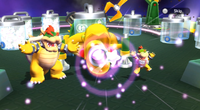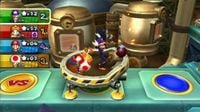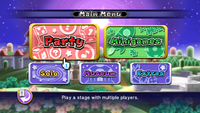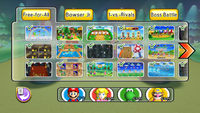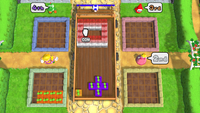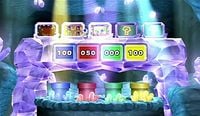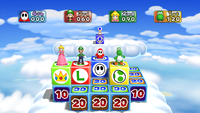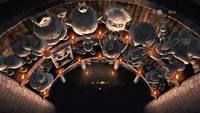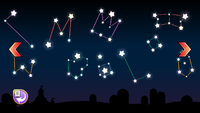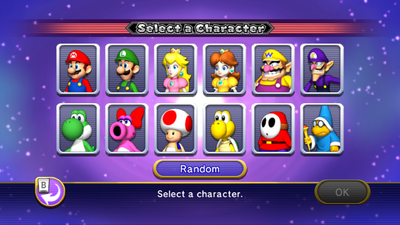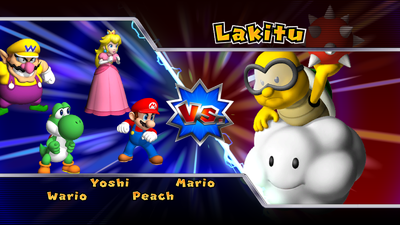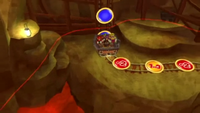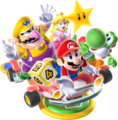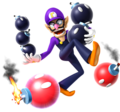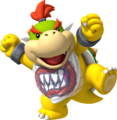Mario Party 9: Difference between revisions
No edit summary |
Tag: Undo |
||
| Line 1: | Line 1: | ||
{{ | {{italic title}} | ||
{{ | {{FA}} | ||
|image=[[File: | {{game infobox | ||
|developer=[[ | |image=[[File:MP9Boxart.jpg|250px]]<br>North American box cover | ||
|publisher=Nintendo | |developer=[[Nintendo Cube|NDcube]]<br>[[CAProduction]]<br>[[Nintendo Software Planning & Development#Group No. 4|Nintendo SPD Group No.4]] | ||
| | |publisher=[[Nintendo]] | ||
|release='''Original release:'''<br>{{flag list|Europe|March 2, 2012|Australia|March 8, 2012|South Africa|March 9, 2012<ref>https://www.nintendo.com/en-za/Games/Wii/Mario-Party-9-281870.html</ref>|Mexico|March 10, 2012<ref>[https://www.levelup.com/Wii/juegos/42745/Mario-Party-9 Mario Party 9 para Wii]. ''LevelUp''.</ref>|USA|March 11, 2012|Japan|April 26, 2012<ref>[http://www.inside-games.jp/article/2012/01/12/53855.html]</ref>|ROC|June 29, 2012<ref>[http://www.nintendo.tw/pressrelease_mp9.htm]</ref>|HK|June 29, 2012<ref>[http://www.nintendo.com.hk/pressrelease_ssqj.htm]</ref>|South Korea|April 11, 2013<ref>http://mariopartylegacy.com/2013/03/south-korea-gets-release-dates-for-mario-party-9-and-mario-tennis-open/</ref><ref>http://www.nintendo.co.kr/Wii/software/marioparty9/index.html/</ref>}}'''[[Nintendo Selects#Wii|Nintendo Selects]]:'''<br>{{flag list|Europe|November 6, 2014}} | |||
|genre=Party | |languages={{languages|en_gb=y|en_us=y|es_es=y|es_latam=y|fr_fr=y|fr_ca=y|de=y|it=y|jp=y|kr=y|zh_trad=y}} | ||
|modes=Single, | |genre=[[Genre#Party|Party]] | ||
|ratings={{ratings|esrb=E|cero=A|pegi=3|usk=6}} | |modes=Single-player, multiplayer | ||
|ratings={{ratings|esrb=E|cero=A|pegi=3|usk=6|acb=G|classind=l|grac=all|gsrr=g|fpb=pg}} | |||
|platforms=[[Wii]] | |platforms=[[Wii]] | ||
| | |format={{format|wii=1}} | ||
|input= | |input={{input|wiimote=1}} | ||
|serials={{flag list|Japan|TSA-RVL-SSQJ-JPN (box); MAA-RVL-SSQJ-JPN (manual)|USA|RVL-SSQE-USA|Europe|RVL-SSQP-EUR}} | |||
}} | }} | ||
'''''Mario Party 9''''' is the ninth home console installment of the [[Mario Party (series)|''Mario Party'' series]] and second for the Wii. The game was developed by [[ | '''''Mario Party 9''''' is the ninth home console installment of the [[Mario Party (series)|''Mario Party'' series]] and the second and final installment for the [[Wii]]. The game was the first in the series to be developed by [[Nintendo Cube|NDcube]] instead of [[Hudson Soft]], as a result of the latter's acquisition by [[Konami]]. It is also the sixteenth in the series overall. The game was released on March 2, 2012 in Europe, in Australia on March 8, 2012, in North America on March 11, 2012, and in Japan on April 26, 2012. The host of the game is a yellow [[Toad (species)|Toad]] for the boards while a blue Toad is the host for minigames, and a green Toad appears near the end of boards to initiate an event similar to the [[Last Five Turns Event]] from past ''Mario Party'' games. This is also the twenty-fifth and final installment of the ''Super Mario'' franchise overall to be released for the Wii console. | ||
==Story== | ==Story== | ||
On a night outside of [[ | [[File:MP9 Bowser Stealing Mini Stars.png|left|thumb|200px|Bowser stealing the Mini Stars using a vacuum machine]] | ||
On a night outside of [[Peach's Castle]], [[Mario]] and his friends are gathered to watch the [[Mini Star]]s glitter in the sky. As Mario peers though the telescope, he is shocked as he notices that the stars are suddenly being sucked through a vortex. It is then revealed to be [[Bowser]] and [[Bowser Jr.]] on a spacecraft, who are using a vacuum-like machine to suck the Mini Stars out of the sky and into containers. Witnessing this, the player's character rallies everyone into setting out to defeat Bowser and save the Mini Stars. As they start their journey, [[Shy Guy]] and [[Kamek]] appear from the woods and infiltrate their group as part of Bowser's plan. | |||
Before each board, there is a cutscene that features Bowser admiring his collection of Mini Stars (or fuming in the last two). Bowser Jr. then runs over to inform his father the progression of the player's group. Bowser is enraged, but confidently summons two of his minions to stop the group before they can take all the Mini Stars. Eventually, however, the group reaches Bowser's space lair, [[Bowser Station]], and face Bowser Jr. before battling his father. | |||
After the final battle with Bowser, the player looks out from the stadium at Bowser's other platform, where the canisters containing all the Mini Stars burst and release them back to where they once were. As this happens, Bowser and Bowser Jr. are flying off. Bowser is mourning over the failure of his plan, which he reveals was to decorate his castle using the Mini Stars. However, upon seeing the released Mini Stars, Bowser is enraged and chases off the ones that fly near him. However, this only results in him falling out of his Koopa Clown Car; Bowser Jr. flies down to save him. Back at Peach's Castle, Mario and friends are once again gathered around the telescope to admire the Mini Stars as they glisten in the night sky. | |||
==Gameplay== | ==Gameplay== | ||
[[File:MP9 Bob-omb explosion.jpg|thumb|200px|left|[[Waluigi]], about to lose half of his Mini Stars at [[Bob-omb Factory]].]] | |||
In ''Mario Party 9'', a new form of gameplay was introduced in this game, retiring the old format seen in the prior eight titles: players move all at once through the board in a vehicle (a car in Toad Road, a magic carpet in Boo's Horror Castle and a legged machine in Bob-omb Factory, for example), still taking turns rolling, moving from a starting point to an ending point. Instead of rolling a die with a 1-10 on it like in the previous games, players can only roll a dice block with a 1-6 on it; however, there are other dice blocks that can be collected, which includes a dice block that allows a 1-10 roll. Instead of trying to collect coins to buy stars, players receive [[Mini Star]]s if they pass by them. While doing so, players must also try to avoid [[Mini Ztar]]s, which deduct their current amount of Mini Stars. The player who collects the most Mini Stars by the end of the game is declared the winner. | |||
New minigame types are introduced in the ''[[Mario Party (series)|Mario Party]]'' series, one example being 1 vs. 2 minigames against [[Bowser Jr.]] Unlike in previous games, players do not compete in minigames after every player has moved, instead only when a minigame is triggered from the space that is landed upon. Also, when receiving dice blocks, a minigame may pop up afterwards. Unlike previous ''Mario Party'' games, where often only the winner(s) of a minigame receives a reward, all [[minigames]] are ranked from first to last place and generally all players receive Mini Stars, with players in a higher position earning more Mini Stars. | |||
During a party, there are two board events that are required to occur before advancing: Captain Events and Boss Battles. The former occurs whenever a player arrives on a Captain Event Space. The event differs for each board, but they all allow the players to earn more Mini Stars, though the player that has started the event always has some form of control over the event, putting him or her in an advantage state. As for Boss Battles, there are two Boss Battle Spaces on every board, one near a fortress and one at the end. During the Boss Battle minigames, players must work together to defeat a boss while attempting to increase their own individual scores, as the player with the highest score wins the minigame, which gives more Mini Stars than normal. | |||
===Modes=== | ===Modes=== | ||
''Mario Party 9'' has Party Mode, Solo Mode, Minigame Mode, | [[File:MP9 Main Menu.png|thumb|The Main Menu]] | ||
====Party mode==== | |||
Once again returning from previous ''Mario Party'' games, Party Mode involves the players going around the board like with the previous games, but changed due to the new gameplay mechanics of ''Mario Party 9''. The amount of Party Points that the players earns is determined by how many Mini Stars they have at the end of the game. However, if handicaps are used, the handicap amount does not count towards the Party Point total; for example, if a player has a 50 Mini Star handicap, and finishes with 100 Mini Stars, they only earn 50 Party Points. Notably, should a player end a game with less than 10 Mini Stars, 10 Party Points are added regardless of how low their Mini Star count is. This is independent for each player that ends with under 10 Mini Stars (for example, a 4-player game that ends with Mini Star counts of 105, 67, 60 and 3 without any handicaps gives a total of 242 Party Points although the Mini Star total is only 235). | |||
====Solo mode==== | |||
The game's story mode, Solo Mode, involves the players traveling across all six boards to defeat Bowser, Bowser Jr., Kamek, and Shy Guy and save the Mini Stars. Completing Solo Mode awards the player 500 Party Points, and the Mini Star grand total is also be added onto the player's Party Point amount; for example, finishing Solo Mode with a grand total of 500 Mini Stars awards the player 1000 Party Points. Shy Guy and Kamek or both appear in all six boards as CPU players competing against the player. | |||
Also, instead of always playing against three other computer players in a four-player match on each board, sometimes, the player plays a three-player match against two computers, or a two-player duel match against one computer (either Kamek or Shy Guy). The minigames for the three-player matches are Free-for-all minigames and 1 vs 2 minigames, and all minigames in two-player matches are Free-for-all minigames, adapted for duels. The award system for minigames in a three-player match is five stars for first place, three stars for second place, and one star for third place, and the award system for minigames in a two-player duel match is five stars for first place and one star for second place. The player often has at least one ally on four boards; if they win instead of the player, then they can still continue to the next board regardless of their final position. If Kamek or Shy Guy wins, then they take all the Mini Stars from the other players and the player must replay the board, similar to a [[Game Over]]. If Kamek or Shy Guy ties with the player or an ally, the player still continues to the next stage. | |||
====Minigame mode==== | |||
[[File:MP9 Free Play Mode.png|thumb|Free Play mode]] | |||
In the minigame mode, players can play various different game modes involving minigames. A blue [[Toad (species)|Toad]] is the host of Minigame Mode. When finished, all game modes award 10 Party Points, except for Free Play, which awards just 1 Party Point per finished minigame. | |||
=====Free Play===== | |||
In the Free Play mode, the players can freely play any minigames they already unlocked in Party Mode. | |||
=====Step It Up===== | |||
{{quote|Be the first player to win a certain number of minigames to become the champion!|In-game description|Mario Party 9}} | |||
[[File:MP9 Step It Up.png|thumb|[[Birdo]] playing Step It Up]] | |||
Step It Up is a returning game mode from ''[[Mario Party DS]]''. As before, players must climb to the top of a staircase by winning minigames; however, in ''Mario Party 9'', this mode can be played by two or three players, players advance up to four steps when winning a minigame as opposed to one, and the last place player selects a random minigame from a roulette wheel. Some minigames, such as [[Logger Heads]], [[10 to Win]], [[Snow Go]] and [[Pizza Me, Mario]], have unique versions in this mode. In these minigames, once a player completes the goal, the minigame ends; in other modes, other players are still active even after the goal is completed. If everyone wins, everyone gets to climb the stairs. If a minigame ends in a draw, no one climbs up any stairs. Players can select whether they want 3, 5, or 7 minigame wins required for victory. Whoever gets to the top first wins and is greeted by a number of celebrating [[Whittle]]s if they get first to 3 wins. If the player gets first to 5 wins, a large silver statue of the winning character is seen. If the player gets first to 7 wins, the statue is gold. | |||
The background of Step It Up resembles [[Tall Trunk Galaxy]] from ''[[Super Mario Galaxy 2]]'', with more Whittles clapping in the background. | |||
;Names in other languages | |||
{{foreign names | |||
|Jap=かちぬきバトル | |||
|JapR=Kachinuki Batoru | |||
|JapM=Knockout Battle | |||
|Spa=Escalera hacia el éxito | |||
|SpaM=Stairway to Success | |||
|Ger=Kletterkampf | |||
|GerM=Climbing Fight | |||
|Fre=Course à l'escalier | |||
|FreM=Stair Race | |||
|Ita=La scalata | |||
|ItaM=The Climb | |||
|Chi=爬梯對戰 | |||
|ChiR=Pátī Duìzhàn | |||
|ChiM=Ladder Battle | |||
|Kor=승자진출전 | |||
|KorR=Seungja Jinchuljeon | |||
|KorM=Winner Advance | |||
}} | |||
=====Garden Battle===== | |||
[[File:MP9 Garden Battle Mode.png|thumb|200px|Garden Battle]] | |||
Garden Battle is a mode that can be played by up to four players. The objective in this mode is the players must fill up their garden with groups of colored plant blocks. The plant groups are randomly chosen from a large cart, and the player who places in first in the previous minigame chooses their plant groups first, followed by second place, then third, then last. If everyone is tied for either first or last place, no one puts any plant blocks. A minigame starts when a player chooses one in the minigame wheel. The player who picks the minigame is at first chosen at random, and then the succeeding choices are made by the player who places in last at the preceding minigame. | |||
The plant groups must be able to fit in their garden, or the player does not have a chance to place one in the patch. The game is won when a player completely fills their garden with plants. | |||
The winner has their flowers bloom with the middle one being the biggest. They then do their victory animation and the losers, as well as the yellow and blue Toad, applaud the winner. If the game is played with fewer than four players, the green Toad applauds the winner too. | |||
;Names in other languages | |||
{{foreign names | |||
|Jap=ガーデンバトル | |||
|JapR=Gāden Batoru | |||
|JapM=Garden Battle | |||
|Ger=Gartengerangel | |||
|GerM=Garden Tussle | |||
|FreE=Bataille de pousses | |||
|FreEM=Sprouts battle, pun on "Bataille de pouces" (thumb war) | |||
|FreA=Bataille de jardin | |||
|FreAM=Garden Battle | |||
|Spa=Batalla de jardines | |||
|SpaM=Gardens Battle | |||
|Ita=Giardinieri in erba | |||
|ItaM=Budding Gardeners | |||
|Chi=花園對戰 | |||
|ChiR=Huāyuán Duìzhàn | |||
|ChiM=Garden Battle | |||
|Kor=가든 배틀 | |||
|KorR=Gadeun Baeteul | |||
|KorM=Garden Battle | |||
}} | |||
=====Choice Challenge===== | |||
{{quote|Players choose three out of five minigames. Points are awarded based on the results of each minigame. The player with the highest total at the end is the champion!|In-game description|Mario Party 9}} | |||
[[File:MP9 Choice Challenge Scoring.jpg|thumb|Choice Challenge]] | |||
Choice Challenge is a game mode that can be played by up to four players. Five free-for-all minigames are randomly chosen, and each player selects three that they would like to play by pressing a corresponding button on the [[Wii#Wii Remote|Wii remote]]. One minigame is announced before the players make their selection as the Chance Minigame; this minigame is worth extra points for the first place player, but normal points for other players. | |||
The players hide in [[Warp Pipe]]s and emerge only when a minigame they are playing is announced, so it is not clear who is competing in each until then. | |||
==== | The minigames are played in the order of how many players selected it, starting at the least and working up to the most. If only one player selects a minigame, that player is automatically awarded first place points without competing. Sometimes, a character appears out of a pipe when they are not participating in the minigame. If that happens, the blue Toad apologizes for his error and corrects the mistake. | ||
[[File:MP9 | |||
Points are awarded for place in minigames, and standings are announced after each minigame. The players with the most points at the end win. The most points a player can score is 350, while the least is 30. It is possible for all four players to win. The losing players emerge out of their pipes in the order of their point totals (from lowest to highest) and perform their losing animation as their points are displayed. The winning players jump out of the golden pipe and perform their victory animation. | |||
;Names in other languages | |||
{{foreign names | |||
|Jap=えらんでバトル | |||
|JapR=Erande Batoru | |||
|JapM=Choose Battle | |||
|Ger=Qual der Wahl | |||
|GerM=Agony of Choice | |||
|Spa=Triple elección | |||
|SpaM=Triple choice | |||
|Fre=Le bon choix | |||
|FreM=The right choice | |||
|Ita=Ardua scelta | |||
|ItaM=Hard Choice | |||
|Chi=選擇對戰 | |||
|ChiR=Xuǎnzé Duìzhàn | |||
|ChiM=Choose Battle | |||
|Kor=골라서 배틀 | |||
|KorR=Gollaseo Baeteul | |||
|KorM=Choose Battle | |||
}} | |||
=====High Rollers===== | |||
{{quote|Play minigames to determine the order in which players roll around the board to pick up points. The first player to reach 500 points is the champion!|In-game description|Mario Party 9}} | |||
[[File:MP9 High Rollers Mode.png|thumb|200px|High Rollers]] | |||
High Rollers is a game mode that can be played with up to four players. In this mode, players compete in a series of minigames to gain up to 500 points by rolling their cube over the panels worth 30, 20 or 10 points. The board is composed of 20 panels and the [[POW Space]] in the center. When a player rolls over a number panel, the amount of points it gives a player decreases by 10. When a panel reaches zero, after everyone moves, the blue Toad resets the panel's value to 30. | |||
The number of spaces the player can move depends on what place they get in the previous minigame. First place is allowed to move four spaces, second place moves three, third place moves two, and last place only moves one. The selected player chooses a minigame by stopping the Minigame Wheel. The player who picks first is selected at random, then the succeeding choices are made by the player who finished last place in the last minigame. Any ties are settled by rolls via [[Dice Block]]s. When there are four players, if there are ties for both first place and last place, the first place players roll first and the players in last place roll next. However, if everyone finished first or last in a minigame, no one moves any spaces. | |||
When a player rolls over the POW Space in the center of the board, every panel's point value is decreased by 10. If a block is at zero, then its value resets to 30. The POW Space can only be used by one player per turn, and is first active when everyone has taken their first turn. | |||
Finally, when there is a 100-point gap in between players, the losing players gain a Boost item, which allows them to dash across the board, rolling over number panels and pushing off other players in their way, without using up a space to move. Players who are knocked off the board are unable to take their turn. When they do get a turn again, they land on the POW Space, activating it if it hasn't already been. If a player is blocked by other players and cannot move, they are teleported to the POW Space. | |||
The game ends when one player gets 500 points or more. | |||
The winner gets to go in the hot-air balloon with the blue, yellow, and green Toads while the others hang on to the string underneath the balloon. | |||
;Names in other languages | |||
{{foreign names | |||
|Jap=コロコロバトル | |||
|JapR=Korokoro Batoru | |||
|JapM=Rolling Battle | |||
|Ger=Wolkenwürfel | |||
|GerM=Cloud Cube | |||
|Spa=Bloques rodantes | |||
|SpaM=Rolling blocks | |||
|FreE=Jeu de cubes | |||
|FreEM=Cube game | |||
|FreA=Défi au cubes | |||
|FreAM=Cube Challenge | |||
|Ita=Il dado è tratto! | |||
|ItaM=The Die is Cast | |||
|Chi=滾滾對戰 | |||
|ChiR=Gǔngǔn Duìzhàn | |||
|ChiM=Rolling Battle | |||
|Kor=데굴데굴 배틀 | |||
|KorR=Deguldegul Baeteul | |||
|KorM=Rolling Battle | |||
}} | |||
=====Time Attack===== | |||
{{main|Time Attack (Mario Party 9)}} | |||
Time Attack is a single player mode. The objective of this mode is to beat the ten given minigames in the quickest amount of time, while earning Challenge Bonuses from completing the Bonus Objectives in each minigame. Earning a Challenge Bonus cuts three seconds off the player's completion time for that minigame. | |||
=====Boss Rush===== | |||
{{quote|Compete for Points in a series of six or twelve Boss Battles. The Player with the most points at the end is the champion.|In-game description|Mario Party 9}} | |||
[[File:MP9 Boss Rush Mode.png|thumb|200px|The hub of the Boss Rush game mode]] | |||
Boss Rush is a game mode that can be unlocked by purchasing it for 500 Party Points in the museum after the player beats Solo mode, and allows up to four players. In this mode, players compete against each other in six or twelve boss minigames to see who can receive the most points at the end of the game. If the player finishes first in a minigame, they receive five points; finishing second gives them three points; third gives the player two, and fourth gives the player one. | |||
The player has the option to play against either the mid-bosses, the stage bosses, or all bosses. The bosses are fought in the same order as Solo Mode. [[Diddy's Banana Blast]] and [[DK's Banana Bonus]] are not fought in Boss Rush, due to the fact that despite being categorized as boss minigames, they are just bonus minigames, and Donkey Kong and Diddy Kong are not faced during them. The player with the most points at the end is the winner. | |||
;Names in other languages | |||
{{foreign names | |||
|Jap=ボスゲートバトル | |||
|JapR=Bosu Gēto Batoru | |||
|JapM=Boss Gate Battle | |||
|Ger=Boss-Marathon | |||
|GerM=Boss Marathon | |||
|Spa=La guarida de los jefes | |||
|SpaM=Bosses hideout | |||
|Fre=Galerie des boss | |||
|FreM=Bosses gallery | |||
|Ita=Corsa allo scontro | |||
|ItaM=Race to Clash | |||
|Chi=首領之門對戰 | |||
|ChiR=Shǒulǐng Zhī Mén Duìzhàn | |||
|ChiM=Boss Gate Battle | |||
|Kor=보스 게이트 배틀 | |||
|KorR=Boseu Geiteu Baeteul | |||
|KorM=Boss Gate Battle | |||
}} | |||
====Museum==== | |||
[[File:MP9 Constellations in the Sky.png|thumb|left|Players can purchase constellations at the Museum, and then view them in the sky.]] | |||
The Museum is where the players can spend Party Points to buy various things such as [[List of constellations in Mario Party 9|Mini Star constellations]], game sounds, vehicles or extra game modes. They can also watch the credits from here. Once they return a constellation into the sky, the players can go to see it in the sky. | |||
====Extras==== | |||
In Extras, the player can play through various extra minigames such as [[Castle Clearout]], [[Shell Soccer]] or an extended version of [[Goomba Bowling]]. There is also a mode called [[Perspective Mode]], in which the player plays through ten minigames that have a modified camera angle, making them harder to win. | |||
{{br}} | |||
==Characters== | ==Characters== | ||
{{multiple image | |||
|align=center | |||
|direction=horizontal | |||
|footer=The character selection and boss matchup screens. | |||
|width=400 | |||
|image1=MP9 Character Selection.png | |||
|alt1=The character selection screen | |||
|image2=MP9 VS Lakitu.png | |||
|alt2=The boss match-up screen | |||
}} | |||
===Playable characters=== | |||
There are a total of 12 playable characters in ''Mario Party 9'', consisting of ten default characters and two unlockable characters, [[Shy Guy]] and [[Kamek]], who must be unlocked by completing Solo Mode. [[Koopa Troopa|Koopa]] is fully playable for the first time in the series, while Kamek also makes his playable ''Mario Party'' debut. Due to their roles as opponents in Solo Mode, neither [[Shy Guy]] nor Kamek are playable in that mode. Shy Guy, previously playable in ''[[Mario Party 4]]'''s [[Beach Volley Folly]] minigame, is also considered a new playable character. | |||
{|class="wikitable"cellpadding="0"style="margin: 0 auto;text-align: center" | |||
![[File:MP9 Mario Icon.png|24px]][[Mario]] | |||
{| class="wikitable" cellpadding="0" style="margin: 0 auto;" | ![[File:MP9 Luigi Icon.png|24px]][[Luigi]] | ||
![[Mario]] | ![[File:MP9 Peach Icon.png|24px]][[Princess Peach|Peach]] | ||
![[Luigi]] | ![[File:MP9 Daisy Icon.png|24px]][[Princess Daisy|Daisy]] | ||
![[Peach]] | ![[File:MP9 Wario Icon.png|24px]][[Wario]] | ||
![[Daisy]] | ![[File:MP9 Waluigi Icon.png|24px]][[Waluigi]] | ||
![[Wario]] | |||
![[Waluigi]] | |||
|- | |- | ||
|[[File:MP9 Select | |[[File:MP9 Mario Character Select Sprite 1.png|75px]] | ||
|[[File:MP9 Select | |[[File:MP9 Luigi Character Select Sprite 1.png|75px]] | ||
|[[File:MP9 Select | |[[File:MP9 Peach Character Select Sprite 1.png|75px]] | ||
|[[File:MP9 Select | |[[File:MP9 Daisy Character Select Sprite 1.png|75px]] | ||
|[[File:MP9 Select | |[[File:MP9 Wario Character Select Sprite 1.png|75px]] | ||
|[[File:MP9 Select | |[[File:MP9 Waluigi Character Select Sprite 1.png|75px]] | ||
|- | |- | ||
![[Yoshi]] | ![[File:MP9 Yoshi Icon.png|24px]][[Yoshi]] | ||
![[Birdo]] | ![[File:MP9 Birdo Icon.png|24px]][[Birdo]] | ||
![[Toad]] | ![[File:MP9 Toad Icon.png|24px]][[Toad]] | ||
![[Koopa Troopa|Koopa]] | ![[File:MP9 Koopa Icon.png|24px]][[Koopa Troopa|Koopa]]* | ||
![[Shy Guy]] | ![[File:MP9 Shy Guy Icon.png|24px]][[Shy Guy]]* | ||
![[Kamek]] | ![[File:MP9 Kamek Icon.png|24px]][[Kamek]]* | ||
|- | |- | ||
|[[File:MP9 Select | |[[File:MP9 Yoshi Character Select Sprite 1.png|75px]] | ||
|[[File:MP9 Select | |[[File:MP9 Birdo Character Select Sprite 1.png|75px]] | ||
|[[File:MP9 Select | |[[File:MP9 Toad Character Select Sprite 1.png|75px]] | ||
|[[File:MP9 Select | |[[File:MP9 Koopa Troopa Character Select Sprite 1.png|75px]] | ||
|[[File:MP9 Select | |[[File:MP9 Shy Guy Character Select Sprite 1.png|75px]] | ||
|[[File:MP9 Select | |[[File:MP9 Kamek Character Select Sprite 1.png|75px]] | ||
|- | |- | ||
|colspan="6"style="text-align: center;"|*Newcomer<br>'''Note:''''' Kamek is referred to simply as [[Magikoopa]] exclusively in North America.'' | |||
|} | |} | ||
===Bosses=== | ===Bosses=== | ||
{|class="wikitable"style="width: 75%; margin: 0 auto;text-align:center" | |||
{| class="wikitable" style="width: 75%; margin: 0 auto;" | |||
!style="width: 5%; background-color: #ddd;"|Toad Road | !style="width: 5%; background-color: #ddd;"|Toad Road | ||
!style="width: 5%; background-color: #ddd;"|Bob-omb Factory | !style="width: 5%; background-color: #ddd;"|Bob-omb Factory | ||
| Line 82: | Line 270: | ||
!style="width: 5%; background-color: #ddd;"|Magma Mine | !style="width: 5%; background-color: #ddd;"|Magma Mine | ||
!style="width: 5%; background-color: #ddd;"|Bowser Station | !style="width: 5%; background-color: #ddd;"|Bowser Station | ||
!style="width: 5%; background-color: #ddd;"|DK's Jungle Ruins | |||
|- | |- | ||
!colspan=" | !colspan="7"style="background-color: #e5e5e5;"|Mid-bosses | ||
|- | |- | ||
![[Lakitu]] | ![[File:MP9 Lakitu Icon.png|16px]][[Lakitu]] | ||
![[Whomp]] | ![[File:MP9 Whomp Icon.png|16px]][[Whomp]] | ||
![[Dry Bones]] | ![[File:MP9 Dry Bones Icon.png|16px]][[Dry Bones]] | ||
![[Cheep | ![[File:MP9 Cheep Cheep Icon.png|16px]][[Cheep Cheep]] | ||
![[Spike | ![[File:MP9 Spike Icon.png|16px]][[Spike]] | ||
![[Bowser Jr.]] | ![[File:MP9 Bowser Jr Icon.png|16px]][[Bowser Jr.]] | ||
![[File:MP9 Diddy Kong Icon.png|x16px]][[Diddy Kong]] | |||
|- | |- | ||
|align="center"|[[File:MP9 Lakitu Bust.png|75px]] | |align="center"|[[File:MP9 Lakitu Bust.png|75px]] | ||
|align="center"|[[File:MP9 Whomp Bust.png|75px]] | |align="center"|[[File:MP9 Whomp Bust.png|75px]] | ||
|align="center"|[[File:MP9 Dry Bones Bust.png|75px]] | |align="center"|[[File:MP9 Dry Bones Bust.png|75px]] | ||
|align="center"|[[File:MP9 Cheep Bust.png|75px]] | |align="center"|[[File:MP9 Cheep Cheep Bust.png|75px]] | ||
|align="center"|[[File:MP9 Spike Bust.png|75px]] | |align="center"|[[File:MP9 Spike Bust.png|75px]] | ||
|align="center"|[[File:MP9 Bowser Jr. | |align="center"|[[File:MP9 Bowser Jr Bust.png|75px]] | ||
|align="center"|[[File:MP9 Diddy Kong Render.png|75px]] | |||
|- | |- | ||
!colspan=" | !colspan="7"style="background-color: #e5e5e5;"|Stage bosses | ||
|- | |- | ||
![[Wiggler]] | ![[File:MP9 Wiggler Icon.png|16px]][[Wiggler]] | ||
![[ | ![[File:MP9 King Bob-omb Icon.png|16px]][[King Bob-omb]] | ||
![[King Boo]] | ![[File:MP9 King Boo Icon.png|16px]][[King Boo]] | ||
![[Blooper]] | ![[File:MP9 Blooper Icon.png|16px]][[Blooper]] | ||
![[Chain Chomp]] | ![[File:MP9 Chain Chomp Icon.png|16px]][[Chain Chomp]] | ||
![[Bowser]] | ![[File:MP9 Bowser Icon.png|16px]][[Bowser]] | ||
![[File:MP9 Donkey Kong Icon.png|x16px]][[Donkey Kong]] | |||
|- | |- | ||
|align="center"|[[File:MP9 Wiggler Bust.png|75px]] | |align="center"|[[File:MP9 Wiggler Bust.png|75px]] | ||
|align="center"|[[File:MP9 | |align="center"|[[File:MP9 King Bob-omb Bust.png|75px]] | ||
|align="center"|[[File:MP9 King Boo Bust.png|75px]] | |align="center"|[[File:MP9 King Boo Bust.png|75px]] | ||
|align="center"|[[File:MP9 Blooper Bust.png|75px]] | |align="center"|[[File:MP9 Blooper Bust.png|75px]] | ||
|align="center"|[[File:MP9 Chain Chomp Bust.png|75px]] | |align="center"|[[File:MP9 Chain Chomp Bust.png|75px]] | ||
|align="center"|[[File:MP9 Bowser Bust.png|75px]] | |align="center"|[[File:MP9 Bowser Bust.png|75px]] | ||
|align="center"|[[File:MP9 Donkey Kong Render.png|75px]] | |||
|- | |||
|colspan="7"style="text-align: center;"|'''Note #1:''''' [[King Bob-omb]] is called Big Bob-omb in the British English version.''<br>'''Note #2:''''' In the case of Donkey Kong and Diddy Kong, they are not featured in the Boss Rush because they are not actual bosses, but their respective minigames (DK's Banana Bonus and Diddy's Banana Blast) are considered to be Boss Minigames for the respective board.'' | |||
|} | |} | ||
===Other | ===Other characters=== | ||
{| | {| | ||
| | | | ||
*[[ | *[[Toad (species)|Toad]]s | ||
*[[Goomba]]s | *[[Goomba]]s | ||
*[[Dry Bones]] | *[[Dry Bones]] | ||
*[[Whittle]]s | *[[Whittle]]s | ||
*[[Pianta]]s | *[[Pianta]]s | ||
*[[Cheep- | *[[Cheep Cheep]]s | ||
*[[Bob-omb]]s | |||
| | | | ||
*[[Urchin]]s | *[[Urchin]]s | ||
*[[Boo]]s | *[[Boo]]s | ||
*[[Dolphin]]s | *[[Dolphin]]s | ||
*[[ | *[[Mechakoopa]]s | ||
*[[Bullet Bill]]s | *[[Bullet Bill]]s | ||
*[[Piranha Plant]]s | *[[Piranha Plant]]s | ||
*[[Spiny|Spinies]] | *[[Spiny|Spinies]] | ||
| | |||
*[[Sushi]] | *[[Sushi]] | ||
*[[Huckit Crab]]s | *[[Huckit Crab]]s | ||
*[[ | *[[Swoop]]ers | ||
*[[Monty Mole]]s | *[[Monty Mole]]s | ||
*[[Hammer Bro]]s. | *[[Hammer Bro]]s. | ||
| Line 152: | Line 339: | ||
| | | | ||
*[[Penguin]]s | *[[Penguin]]s | ||
*[[ | *[[Spike]]s | ||
*[[Mr. Blizzard]]s | *[[Mr. Blizzard]]s | ||
*[[ | *[[Fish Bone]]s | ||
*[[Deep-Cheep]]s | *[[Deep Cheep|Deep-Cheep]]s | ||
*[[Thwomp]]s | *[[Thwomp]]s | ||
*[[Scaredy Rat]]s | |||
|} | |} | ||
== | ==Boards== | ||
'' | '''Note:''' There are three different exclusive vehicles for each board, one available from the start and the other two purchasable from the Museum for 200 Party Points each. They all function identically, but their type depends on the board (for example, cars are used throughout Toad Road). The third vehicle is based off of the stage boss. | ||
{|class="wikitable"style="width: 100%;" | |||
!Stage | |||
!Description | |||
!width=10%|Captain Event(s) | |||
|- | |||
|[[File:MP9 Toad Road.png|200px]] | |||
|rowspan="2"|{{anchor|Toad Mobile}}{{anchor|Rickety Ride}}{{anchor|Wiggler Wagon}}'''Toad Road''' is the first stage in the game, and thus it is a simple stage with almost no gimmicks. It is designed after [[World 1 (New Super Mario Bros. Wii)|World 1]] from ''[[New Super Mario Bros. Wii]]'', and features lush grassland, flowers and windmills. A broken bridge prevents players from moving forward, and if the players fail to roll a certain total number, they fall to a lower route filled with [[Mini Ztar Space]]s. | |||
{|align=center | |||
|align=center colspan=3|Vehicles (cars) | |||
|- | |||
|[[File:MP9ToadMobile.png|100px]] | |||
|[[File:MP9Rickety Ride.png|100px]] | |||
|[[File:MP9Wiggler Wagon.png|100px]] | |||
|- | |||
!align=center|<small>Toad Mobile | |||
!align=center|<small>Rickety Ride | |||
!align=center|<small>Wiggler Wagon | |||
|} | |||
|rowspan="2"|[[Toad Road#9 Island|9 Island]] | |||
|- | |||
|style="text-align: center; background-color: #eee;"|[[Toad Road]] | |||
|- | |||
|[[File:MP9 Bob-omb Factory.png|200px]] | |||
|rowspan="2"|{{anchor|Factory Walker}}{{anchor|Gear Shifter}}{{anchor|King Bob-omb Bus}}'''Bob-omb Factory''' is the second stage in ''Mario Party 9''. Players move around a room full of conveyor belts, and if the Captain lands on an Event Space, the conveyor belts move the group of players around, but also the various spaces. [[Bob-omb]]s occasionally intrude the players' game. Whenever a Bob-omb explodes, the Captain loses half of their Mini Stars. | |||
{|align=center | |||
|align=center colspan=3|Vehicles (quadruped vehicles) | |||
|- | |||
|[[File:MP9FactoryWalker.png|100px]] | |||
|[[File:MP9GearShifter.png|100px]] | |||
|[[File:MP9BigBob-ombBus.png|100px]] | |||
|- | |||
!align=center|<small>Factory Walker | |||
!align=center|<small>Gear Shifter | |||
!align=center|<small>King Bob-omb Bus | |||
|} | |||
|rowspan="2"|[[Bob-omb Factory#Side-by-Side Zone|Side-by-Side Zone]] | |||
|- | |||
|style="text-align: center; background-color: #eee;"|[[Bob-omb Factory]] | |||
|- | |||
|[[File:MP9 Boo's Horror Castle.png|200px]] | |||
|rowspan="2"|{{anchor|Flying Carpet}}{{anchor|Float Mattress}}{{anchor|Boo Blanket}}'''Boo's Horror Castle''' is the third stage in ''Mario Party 9''. Players move throughout a big castle, which is haunted with [[Boo]]s. After a Captain passes a Boo Portrait, a Boo comes out of it. If a Captain is caught by a Boo, the Boo will steal half of their Mini Stars. Boos follow the players until they leave the current hallway, or enter an alternative room with lights. Before the players can face the boss, the Captain must roll a higher number than the specified numeral on the gate. | |||
{|align=center | |||
|align=center colspan=3|Vehicles (floating carriers) | |||
|- | |||
|[[File:MP9FlyingCarpet.png|100px]] | |||
|[[File:MP9FloatMattress.png|100px]] | |||
|[[File:MP9BooBlanket.png|100px]] | |||
|- | |||
!align=center|<small>Flying Carpet | |||
!align=center|<small>Float Mattress | |||
!align=center|<small>Boo Blanket | |||
|} | |||
|rowspan="2"|[[Boo's Horror Castle#Scaredy Rat Race|Scaredy Rat Race]] | |||
|- | |||
|style="text-align: center; background-color: #eee;"|[[Boo's Horror Castle]] | |||
|- | |||
|[[File:MP9 Blooper Beach.png|200px]] | |||
|rowspan="2"|{{anchor|Sub Baleen}}{{anchor|Coral Explorer}}{{anchor|Blooper Boat}}'''Blooper Beach''' is the fourth stage in ''Mario Party 9''. Players travel along an ocean to reach the end goal. If a Captain passes by a [[Dolphin]], they get five Mini Stars. However, a [[Sushi]] takes away half of the Captain's Mini Stars. [[Huckit Crab]]s turn all the Mini Stars on the stage into Mini Ztars if a Captain lands on an [[Happening Space|Event Space]], and vice versa if they land on it again. | |||
{|align=center | |||
|align=center colspan=3|Vehicles (boats) | |||
|- | |||
|[[File:MP9SubBaleen.png|100px]] | |||
|[[File:MP9CoralExplorer.png|100px]] | |||
|[[File:MP9BlooperBoat.png|100px]] | |||
|- | |||
!align=center|<small>Sub Baleen</small>{{footnote|main|1}} | |||
!align=center|<small>Coral Explorer | |||
!align=center|<small>Blooper Boat | |||
|} | |||
|rowspan="2"|[[Blooper Beach#Sunken Treasure|Sunken Treasure]] | |||
|- | |||
|style="text-align: center; background-color: #eee;"|[[Blooper Beach]] | |||
|- | |||
|[[File:MP9 Magma Mine Start.png|200px]] | |||
|rowspan="2"|{{anchor|Shaky Mine Cart}}{{anchor|Bone Barrow}}{{anchor|Chain Chomp Coupe}}'''Magma Mine''' is the fifth stage in ''Mario Party 9''. This stage takes place in an active volcano where players mainly travel up and out of the vent. Players must escape rising magma that rises two spaces each turn, and is increased further if a Captain lands on a Magma Space. The Captain must avoid getting hit by magma, or they lose half of their Mini Stars. In Solo Mode, both [[Kamek]] and [[Shy Guy]] will appear; if they are the only opponents, this ensures the player will have to be the Superstar to move on. | |||
{|align=center | |||
|align=center colspan=3|Vehicles (wagons) | |||
|- | |||
|[[File:MP9ShakyMineCart.png|100px]] | |||
|[[File:MP9BoneBarrow.png|100px]] | |||
|[[File:MP9ChainChompCoupe.png|100px]] | |||
|- | |||
!align=center|<small>Shaky Mine Cart | |||
!align=center|<small>Bone Barrow</small>{{footnote|main|2}} | |||
!align=center|<small>Chain Chomp Coupe | |||
|} | |||
|rowspan="2"|[[Magma Mine#Dice Block Chicken|Dice Block Chicken]] | |||
|- | |||
|style="text-align: center; background-color: #eee;"|[[Magma Mine]] | |||
|- | |||
|[[File:MP9 Bowser Station.png|200px]] | |||
|rowspan="2"|{{anchor|Space Scuttle}}{{anchor|Shiny Saucer}}{{anchor|Starship Bowser}}'''Bowser Station''' is the sixth stage in ''Mario Party 9''. [[Bowser Jr.]] and [[Bowser]] are the stage's mid-boss and boss, respectively. A Jackpot Machine here increases in Mini Stars if a Captain lands on a Jackpot+ Space. If the Jackpot Machine happens to have 20 or more Mini Stars, a Jackpot Minigame commences, with the total prize being the Mini Stars in the machine. Oddly enough, this stage has no actual hazards. In Solo Mode, both [[Kamek]] and [[Shy Guy]] appear; if they are the only opponents, this ensures the player will have to be the Superstar to complete the game. | |||
{|align=center | |||
|align=center colspan=3|Vehicles (spaceships) | |||
|- | |||
|[[File:MP9SpaceScuttle.png|100px]] | |||
|[[File:MP9ShinySaucer.png|100px]] | |||
|[[File:MP9StarshipBowser.png|100px]] | |||
|- | |||
!align=center|<small>Space Scuttle</small>{{footnote|main|3}} | |||
!align=center|<small>Shiny Saucer | |||
!align=center|<small>Starship Bowser | |||
|} | |||
|rowspan="2"|[[Bowser Station#Heart Star Colony|Heart Star Colony]]<br>[[Bowser Station#Bingo Colony|Bingo Colony]]<br>[[Bowser Station#Speed Star Colony|Speed Star Colony]] | |||
|- | |||
|style="text-align: center; background-color: #eee;"|[[Bowser Station]] (unlockable) | |||
|- | |||
|[[File:MP9 DK's Jungle Ruins.png|200px]] | |||
|rowspan="2"|{{anchor|Barrel Roller}}{{anchor|Jungle Junker}}{{anchor|DK's Banana Slider}}'''DK's Jungle Ruins''' is the seventh stage in ''Mario Party 9'', which can be purchased from the Museum for 500 Party Points. Instead of collecting Mini Stars, players collect [[Banana]]s while trying to avoid [[Z-Banana]]s. Players must make two laps around the stage to complete a game. Bananas and Z-Bananas are placed on each space rather than between them. The actual Boss Minigames in this stage are done in form of a bonus minigame to collect Bananas. These games are hosted by [[Diddy Kong]] and [[Donkey Kong]] respectively. | |||
{|align=center | |||
|align=center colspan=3|Vehicles (four-wheel drive) | |||
|- | |||
|[[File:MP9BarrelRoller.png|100px]] | |||
|[[File:MP9JungleJunker.png|100px]] | |||
|[[File:MP9DK'sBananaSlider.png|100px]] | |||
|- | |||
!align=center|<small>Barrel Roller | |||
!align=center|<small>Jungle Junker | |||
!align=center|<small>DK's Banana Slider | |||
|} | |||
|rowspan="2"|[[DK's Jungle Ruins#Barrel Choice|Barrel Choice]] | |||
|- | |||
|style="text-align: center; background-color: #eee;"|[[DK's Jungle Ruins]] (unlockable) | |||
|} | |||
{{footnote|note|1|Pun on "{{wp|submarine}}" and "{{wp|baleen}}"}} | |||
{{footnote|note|2|Pun on "{{wp|bone marrow}}" and "{{wp|Wheelbarrow|barrow}}"}} | |||
{{footnote|note|3|Pun on "{{wp|space shuttle}}" and "{{wp|scuttle}}"}} | |||
== | ==Minigames== | ||
[[File:MP9 4-Player Logger Heads.png|thumb|[[Logger Heads]], one of the minigames in ''Mario Party 9''|260px]] | |||
{{main|List of Mario Party 9 minigames}} | |||
''Mario Party 9'' has a total of 78 main minigames, as well as [[Castle Clearout]], [[Shell Soccer]] and an extended version of [[Goomba Bowling]] playable only in Extra Mode. There are 44 Free-for-all minigames, 10 1-vs-Rivals minigames, 14 Boss Minigames (Including [[Diddy's Banana Blast]] and [[DK's Banana Bonus]]), and 10 newly-introduced Bowser Jr. minigames, in which two players team up against [[Bowser Jr.]] All of the minigames, apart from the extra ones, are playable during various events in the parties, in the various modes of Minigame Mode and a select ten with a single player in the new [[Perspective Mode]], which uses a different camera angle from the one normally seen when playing the minigames. | |||
{{br}} | |||
== | ==Items== | ||
{ | Instead of more traditional items, ''Mario Party 9''<nowiki>'</nowiki>s items consist entirely of [[Dice Block]]s, allowing the user to roll a specific number more easily from a specific range of values. These can be obtained by landing on a [[Special Dice Block Space|Dice Block Space]]. | ||
{|class="wikitable"style="width: 75%; margin: 0 auto;text-align:center" | |||
!Item | |||
!Image | |||
!Description | |||
|- | |||
|[[Dice Block]] | |||
|[[File:MP9 Dice Block Artwork.png|100px]] | |||
|Dice Block numbered 1 to 6. The dice rolled if no items are used. (1, 2, 3, 4, 5, 6) | |||
|- | |||
|[[Slow Dice Block]] | |||
|[[File:MP9 Slow Dice Block.png|100px]] | |||
|Dice Block numbered 1 to 6 that rolls slowly to allow for ease of rolling a specific number. (1, 2, 3, 4, 5, 6) | |||
|- | |||
|[[0-1 Dice Block]] | |||
|[[File:0-1 DiceBlock.png|100px]] | |||
|Dice Block numbered 0 to 1. (0, 0, 0, 1, 1, 1) | |||
|- | |||
|[[1-2-3 Dice Block]] | |||
|[[File:MP9 1-2-3 Dice Block Artwork.png|100px]] | |||
|Dice Block numbered 1 to 3. (1, 1, 2, 2, 3, 3) | |||
|- | |||
|[[4-5-6 Dice Block]] | |||
|[[File:4-5-6 DiceBlock.png|100px]] | |||
|Dice Block numbered 4 to 6. (4, 4, 5, 5, 6, 6) | |||
|- | |||
|[[1-10 Dice Block]] | |||
|[[File:MP9 1-10 Dice Block Artwork.png]] | |||
|Dice Block numbered 1 to 10. (1, 2, 3, 4, 5, 6, 7, 8, 9, 10) | |||
|} | |||
==Spaces== | ==Spaces== | ||
When a player lands on a space, something is going to happen. Each space has | [[File:MP9 Prerelease Magma Mine.png|thumb|200px|[[Magma Mine]]]] | ||
When a player lands on a space, something is going to happen. Each space has its own effect, but like in previous ''Mario Party'' games, every space is color-coded. The color of the space tells what kind of event is going to happen. | |||
*Normal Spaces | *Normal Spaces | ||
**'''Blue Spaces''' - | **'''Blue Spaces''' - Triggers good events and helps the player who landed on it. | ||
**'''Red Spaces''' - | **'''Red Spaces''' - Trigger bad events and hinders the player who landed on it. | ||
**'''Green Spaces''' - | **'''Green Spaces''' - Neutral spaces that often lets one or all players attend an event that can either help or hinder the player. | ||
**'''Yellow Spaces''' - | **'''Yellow Spaces''' - Trigger minigames when landed on. | ||
**''' | **'''White Spaces''' - Adds Mini Stars to the Jackpot on the Bowser Station board. | ||
*Star Spaces | *Star Spaces | ||
**'''Mini Star Spaces''' - | **'''Mini Star Spaces''' - Gives Mini Stars to the player who landed on it. | ||
**'''Mini Ztar Spaces''' - | **'''Mini Ztar Spaces''' - Takes Mini Stars from the player who landed on it. | ||
If the player moves over | If the player moves over a space with a prohibitory sign on it, they automatically stops at that space and an event starts. The only two spaces of this kind are the Boss Space and the Captain Event Space. | ||
Because of the new rules in ''Mario Party 9'', there are many new spaces | Because of the new rules in ''Mario Party 9'', there are many new spaces introduced. Some old spaces returned as well, but some have a different effect (for example the [[Blue Space]]). With a total of 21 different kind of spaces, ''Mario Party 9'' has the most spaces of the series. Also for the first time in the ''Mario Party'' series, some spaces are unique for a specific board. Here is a list of all the spaces in the game, with what kind of effect they have. | ||
{|class="wikitable" | |||
{| class="wikitable" | |||
!colspan="2"|Space | !colspan="2"|Space | ||
!Effect | !Effect | ||
| Line 196: | Line 537: | ||
!colspan="4"|Appears on all boards | !colspan="4"|Appears on all boards | ||
|- | |- | ||
|Green Space | |[[Green Space]] | ||
|[[File:MP9 Green Space.png|30px]] | |align="center"|[[File:MP9 Green Space.png|30px]] | ||
| | |Nothing happens when the player lands here. | ||
|Common | |Common | ||
|- | |- | ||
|[[ | |[[Special Dice Block Space|Dice Block Space]] | ||
|[[File:MP9 Dice Space.png|30px]] | |align="center"|[[File:MP9 Special Dice Block Space.png|30px]] | ||
|The | |The player landing here receives a special [[Dice Block]]. | ||
|Common | |Common | ||
|- | |- | ||
|[[ | |[[Lucky Space]] | ||
|[[File:MP9 | |align="center"|[[File:MP9 Lucky Space.png|30px]] | ||
| | |Something good happens to the player landing here. | ||
| | |Semi-Common | ||
|- | |||
|[[Unlucky Space]] | |||
|align="center"|[[File:MP9 Unlucky Space.png|30px]] | |||
|Something bad happens if the player lands here. | |||
|Rare | |||
|- | |- | ||
| | |[[Event Space]] | ||
|[[File:MP9 | |align="center"|[[File:MP9 Happening Space.png|30px]] | ||
| | |As the player lands here, a special event occurs. | ||
|Uncommon | |Uncommon | ||
|- | |- | ||
|[[ | |[[Change Space|Shuffle Space]] | ||
|[[File:MP9 | |align="center"|[[File:MP9 Shuffle Space.png|30px]] | ||
|The Captain | |The players' order to become Captain changes. | ||
| | |Semi-Common (None when playing with 2 players) | ||
|- | |- | ||
| | |[[Dash Space]] | ||
|[[File:MP9 | |align="center"|[[File:MP9 Dash Space.png|30px]] | ||
|The | |The player landing here can move again by hitting another Dice Block. | ||
| | |Uncommon | ||
|- | |- | ||
|[[ | |[[Back Space (random)|Back Space]] | ||
|[[File:MP9 | |align="center"|[[File:MP9 Back Space.png|30px]] | ||
| | |The player landing here has to move backwards by hitting a Dice Block again. | ||
|Uncommon | |Uncommon | ||
|- | |- | ||
|[[ | |[[Spin Space]] | ||
|[[File:MP9 | |align="center"|[[File:MP9 Spin Space.png|30px]] | ||
| | |Something special happens to the player landing here, helping them. | ||
| | |Uncommon | ||
|- | |- | ||
|- | |- | ||
|[[Bowser Space]] | |[[Bowser Space]] | ||
|[[File:MP9 Bowser Space.png|30px]] | |align="center"|[[File:MP9 Bowser Space.png|30px]] | ||
| | |If the player lands here, they summon Bowser to hinder them. | ||
|Uncommon (Common near the end of | |Uncommon (Common near the end of stages) | ||
|- | |||
|rowspan="4"|[[Mini Star Space]] | |||
|align="center"|[[File:MP9 Plus 1 Mini Star Space.png|30px]] | |||
|The player landing here receives the number of Mini Stars over the space. | |||
|rowspan="4"|Rare | |||
|- | |- | ||
| | |align="center"|[[File:MP9 Plus 2 Mini Stars Space.png|30px]] | ||
|[[File:MP9 | |If the player lands here, they get 2 Mini Stars. | ||
| | |||
|- | |- | ||
|[[File:MP9 | |align="center"|[[File:MP9 Plus 3 Mini Stars Space.png|30px]] | ||
| | |If the player lands here, they get 3 Mini Stars. | ||
|- | |- | ||
|[[File:MP9 | |align="center"|[[File:MP9 Plus 5 Mini Stars Space.png|30px]] | ||
| | |If the player lands here, they get 5 Mini Stars. | ||
|- | |- | ||
|[[File:MP9 | |rowspan="4"|[[Mini Ztar Space]] | ||
| | |align="center"|[[File:MP9 Plus 1 Mini Ztar Space.png|30px]] | ||
|Rare | |If the player lands here, they lose Mini Stars. | ||
|rowspan="4"|Rare | |||
|- | |- | ||
| | |align="center"|[[File:MP9 Plus 2 Mini Ztars Space.png|30px]] | ||
|[[File:MP9 | |If the player lands here, they lose 2 Mini Stars. | ||
| | |||
|- | |- | ||
|[[File:MP9 | |align="center"|[[File:MP9 Plus 3 Mini Ztars Space.png|30px]] | ||
| | |If the player lands here, they lose 3 Mini Stars. | ||
|- | |- | ||
|[[File:MP9 | |align="center"|[[File:MP9 Plus 5 Mini Ztars Space.png|30px]] | ||
| | |If the player lands here, they lose 5 Mini Stars. | ||
|- | |- | ||
|[[File:MP9 | |[[Captain Event Space]] | ||
| | |align="center"|[[File:MP9 Captain Space.png|30px]] | ||
| | |Arriving at or landing on this space triggers a Captain Event and will automatically end the Captain's turn on this space. | ||
|1 on each stage except for [[Blooper Beach]] and [[Magma Mine]], which have 2, and [[Bowser Station]], which has 3. | |||
|- | |- | ||
| | |[[Boss Battle Space]] | ||
|[[File:MP9 | |align="center"|[[File:MP9 Boss Space.png|30px]] | ||
| | |Arriving at or landing on this space triggers a Boss Battle and will automatically end the Captain's turn on this space. | ||
| | |2 on each stage | ||
|- | |- | ||
|[[ | |[[Free-for-All Space]] | ||
|[[File:MP9 | |align="center"|[[File:MP9 VS Space.png|30px]] | ||
| | |If the player lands here, everyone competes in a minigame. | ||
|Semi-Common | |Semi-Common | ||
|- | |- | ||
|[[1-Vs-3 Space|1-vs-Rival Space]] | |||
|[[File:MP9 | |align="center"|[[File:MP9 1-Vs-3 Space Sprite.png|30px]] | ||
| | |If the player lands here, they trigger a 1-vs-Rival minigame with them being the solo player. | ||
|Uncommon | |Uncommon (None when playing with 2 players) | ||
|- | |- | ||
|[[File:MP9 | |[[Bowser Jr. Space]] | ||
| | |align="center"|[[File:MP9 Bowser Jr Space.png|30px]] | ||
|Uncommon | |If the player lands here, they and another randomly-chosen player take part in a Bowser Jr. minigame. | ||
|Uncommon (None when playing with 2 players) | |||
|- | |- | ||
|[[Battle Space]] | |||
|[[ | |align="center"|[[File:MP9 Battle Space.png|30px]] | ||
| | |A minigame commences in which all players must participate. Mini Stars are distributed differently from regular minigames. | ||
|Semi-Common (None when playing with 2 players) | |||
|[[File:MP9 | |||
| | |||
| | |||
|- | |- | ||
!colspan="4"|Board-specific Spaces | !colspan="4"|Board-specific Spaces | ||
|- | |- | ||
|rowspan="3"|Magma Space | |rowspan="3"|[[Magma Space]] | ||
|[[File:MP9 | |align="center"|[[File:MP9 Plus 2 Magma Space.png|30px]] | ||
|Raises the lava level by 2 on the [[Magma Mine]] board. | |Raises the lava level by 2 on the [[Magma Mine]] board. | ||
|Common | |Common | ||
|- | |- | ||
|[[File:MP9 | |align="center"|[[File:MP9 Plus 3 Magma Space.png|30px]] | ||
|Raises the lava level by 3 on the [[Magma Mine]] board. | |Raises the lava level by 3 on the [[Magma Mine]] board. | ||
|Semi-Common | |Semi-Common | ||
|- | |- | ||
|[[File:MP9 | |align="center"|[[File:MP9 Plus 4 Magma Space.png|30px]] | ||
|Raises the lava level by 4 on the [[Magma Mine]] board. | |Raises the lava level by 4 on the [[Magma Mine]] board. | ||
|Uncommon | |Uncommon | ||
|- | |- | ||
|rowspan="2"|Jackpot+ Space | |rowspan="2"|[[Jackpot+ Space]] | ||
|[[File:MP9 Jackpot5 Space.png|30px]] | |align="center"|[[File:MP9 Jackpot5 Space.png|30px]] | ||
|Adds 5 Mini Stars to the Jackpot Machine on [[Bowser Station]]. | |Adds 5 Mini Stars to the Jackpot Machine on [[Bowser Station]]. | ||
| | |rowspan="2"|Common | ||
|- | |- | ||
|[[File:MP9 Jackpot8 Space.png|30px]] | |align="center"|[[File:MP9 Jackpot8 Space.png|30px]] | ||
|Adds 8 Mini Stars to the Jackpot Machine on [[Bowser Station]]. | |Adds 8 Mini Stars to the Jackpot Machine on [[Bowser Station]]. | ||
|- | |- | ||
|[[DK Space]] | |[[DK Space]] | ||
|[[File:MP9 DK Space.png|30px]] | |align="center"|[[File:MP9 DK Space.png|30px]] | ||
| | |If the player lands here, DK starts an activity where they try to collect the most Bananas spinning in a circle around the board. | ||
|Common | |Common | ||
|- | |- | ||
|[[Jackpot+ Space|Jackpot Space]] | |||
|align="center"|[[File:MP9 Lucky Space.png|30px]] | |||
|Gives the Captain all the Mini Stars stored on the Jackpot Machine. | |||
|Rare | |||
|} | |||
==Differences from previous ''Mario Party'' games== | |||
This is the first ''Mario Party'' in the series: | |||
*to not be developed by [[Hudson Soft]]. | |||
*to have [[Mini Star]]s instead of [[coin]]s and [[Star (Mario Party series)|Power Stars]]. | |||
*to change the core board gameplay by having all the players together in one vehicle. | |||
*to not have [[Red Space]]s, replacing them with Mini Ztar Spaces. | |||
*to not include Advice or Hints in the Minigame Rules Screen. | |||
*to not include a category of 2-vs-2-Minigames, and the first since ''[[Mario Party 2]]'' to not include a category of Duel Minigames (if the 1-vs.-1 Story Minigames and/or the etc. Minigames from ''Mario Party 4'' are counted as Duel Minigames). Additionally, it does not have the team battle mode first introduced in ''Mario Party 4''. | |||
*since ''Mario Party 2'' to have only one save file instead of three. | |||
*since ''Mario Party 6'' to not feature [[Toadette]] in any capacity. | |||
*to not use the usual ''Mario Party'' font for the in-game text in any way. | |||
*to use the [[List of fonts#Modern Super Mario typeface|modern font]] for the in-game text, first used in ''[[Super Mario 3D Land]]''. | |||
*to not save game progress after every turn, instead saving after the game is over. | |||
*to not start out with a 1-10 Dice Block. | |||
*to have fewer playable characters than its numbered predecessor. | |||
*since ''Mario Party 3'' to have a unique Superstar animation. | |||
*to allow the player to progress in the Solo Mode without winning on a board (as the player can still progress when achieving a tie or when an ally wins on a board). | |||
*to have a separate win screen after a minigame ends, instead of the traditional minigame endings. | |||
==Reception== | |||
Reviews for ''Mario Party 9'' have been generally mixed to positive. It has received a 73 from Metacritic based on 45 reviews.<ref>[http://www.metacritic.com/game/wii/mario-party-9 Metacritic score for ''Mario Party 9''.] ''Metacritic''. Retrieved June 10, 2017.</ref> and a 75.05% from GameRankings based on 30 reviews.<ref>[http://www.gamerankings.com/wii/632974-mario-party-9/index.html GameRankings score for ''Mario Party 9''.] ''GameRankings''. Retrieved June 10, 2017.</ref> IGN gave it a 7/10 explaining that the graphics are good but the music is repetitive and the luck plays a big role in determining a player's fate in the game. GameSpot gave it a 6.0 explaining that it is too familiar and that Solo mode is tedious and required for unlocks. Game Informer gave the game a 5.75/10, explaining that the game relies far too heavily on luck and can make for a "disheartening experience."<ref>[http://www.gameinformer.com/games/mario_party_9/b/wii/archive/2012/03/09/mario-party-9-review-a-small-step-towards-positive-change.aspx Game Informer Score for ''Mario Party 9''.] ''Game Informer''. Retrieved June 29, 2017.</ref> Destructoid gave the game a 7.5/10, praising the reduction of motion-control minigames, and saying that many of the minigames feel like true ''Super Mario'' experiences and not ''Super Mario'' versions of party games, and that the influence of ''[[New Super Mario Bros. Wii]]'' and ''[[Super Mario Galaxy]]'', and to a lesser extent, ''[[Super Mario Sunshine]]'', is "pretty much the game's central theme," and that it feels more like an "honest-to-god" ''Super Mario'' game than the other entries, but complained that the game is still determined a lot by chance.<ref>[https://www.destructoid.com/review-mario-party-9-224500.phtml Destructiod score for ''Mario Party 9''.] ''Destructoid''. Retrieved June 29, 2017.</ref> | |||
{| class="wikitable reviews" | |||
!colspan="4"style="font-size:120%; text-align: center; background-color:silver"|Reviews | |||
|-style="background-color:#E6E6E6" | |||
|Release | |||
|Reviewer, Publication | |||
|Score | |||
|Comment | |||
|- | |||
|[[Wii]] | |||
|Samuel Claiborn, [http://www.ign.com/articles/2012/03/10/mario-party-9-review IGN] | |||
|7.0/10 | |||
|align="left"|"''The Mario Party games are meant to be played with a room of friends (and the total lack of online play reflects this). But every party will always be subverted by this entry's reliance on randomness to "shake things up," as Bowser puts it when he is about to do something awful to you. This is especially irksome for me because I can envision what Mario Party 9 could be -- a clever, strategic board game with mini-games interspersed would be truly awesome.''" | |||
|- | |||
|Wii | |||
|Ashton Raze, [https://www.gamespot.com/reviews/mario-party-9-review/1900-6365698/ GameSpot] | |||
|6/10 | |||
|align="left"|"''Overall, Mario Party 9 is a decent package with a lot of content, even if the Story mode is something you'll wish you could avoid. It's colorful, good looking, and fun with others, but after so many games, the appeal just isn't going to last for many people. There's no denying that what Mario Party 9 does, it largely does well; it's just that it's largely been doing it well for nine console games and two handheld games. Once you've spent a few hours with mates, seen all the different boards, and played all the minigames, there's very little incentive to return. Much like that high school reunion, it is fun for a night, but you won't have any hesitation about moving on.''" | |||
|- | |||
|Wii | |||
|Jonathan Holmes, [https://www.destructoid.com/review-mario-party-9-224500.phtml Destructoid] | |||
|7.5/10 | |||
|align="left"|"''Solid and definitely has an audience. There could be some hard-to-ignore faults, but the experience is fun.''" | |||
|- | |||
|Wii | |||
|Kyle Hilliard, [http://www.gameinformer.com/games/mario_party_9/b/wii/archive/2012/03/09/mario-party-9-review-a-small-step-towards-positive-change.aspx Game Informer] | |||
|5.75/10 | |||
|align="left"|"''There are things about Mario Party 9 that make it a better experience than previous entries, but overall it's still a disheartening experience. The best times I experienced with the game were the times when co-workers and I were laughing at each other’s stupid mistakes while playing, but you really don't need a video game to fuel stupid mistakes worth laughing at.''" | |||
|- | |||
|Wii | |||
|Tom Orry, [https://www.videogamer.com/reviews/mario-party-9-review VideoGamer.com] | |||
|7/10 | |||
|align="left"|"''The Wii has always been about bringing people together to play, and Mario Party 9 does that considerably better than I thought it would.''" | |||
|- | |||
!colspan="4"style="background-color:silver; font-size:120%; text-align: center;"|Aggregators | |||
|-style="background-color:#E6E6E6" | |||
|colspan=2|Compiler | |||
|colspan=2|Platform / Score | |||
|- | |||
|colspan=2|Metacritic | |||
|colspan=2 style="background-color:gold"|[http://www.metacritic.com/game/wii/mario-party-9/critic-reviews 73] | |||
|- | |||
|colspan=2|GameRankings | |||
|colspan=2|[http://www.gamerankings.com/wii/632974-mario-party-9/index.html 75.05%] | |||
|} | |} | ||
{{br}} | |||
===Sales=== | |||
''Mario Party 9'' is the 26th best-selling game for the Wii, having sold 2.24 million copies worldwide, as of September 2012.<ref>[https://www.nintendo.co.jp/ir/pdf/2012/121025e.pdf#page=7 Financial Results Briefing for the Six Month Period Ended September 2012 (Briefing Date: 2012/10/25)]. ''Nintendo.co.jp''. Retrieved June 28, 2022.</ref> | |||
==Promotion== | |||
===''Mario Party 9'' Party Crashers Contest=== | |||
The '''''Mario Party 9'' Party Crashers Contest''' was a contest sponsored by Nintendo of America from March 1, 2012 at 10:00 EST until March 7, 2012 at 23:59 EST. Participants were required to organize a party of 25 confirmed guests at a location of their choosing within the {{wp|United States}} (excluding {{wp|Hawaii}}), follow Nintendo of America on Twitter, and, using the [[List of hashtags|hashtag]] "#1UPMyParty", tweet in 140 characters or less why they would want to {{wp|Gate crashing|have their party crashed}}. The company then judged the tweets based on "how uniquely, creatively and enthusiastically [they show] love for ''Mario Party 9''" and selected six winning entries, the authors of which would receive a Wii, a copy of ''Mario Party 9'', and a 30-minute visit from Mario and Luigi at the author's party.<ref>{{cite|url=marioparty9.nintendo.com/contest.html#/contest|title=Official Rules for Mario Party 9 Party Crashers Contest|publisher=marioparty9.nintendo.com|accessdate=August 9, 2024|archive=web.archive.org/web/20150226233441/http://marioparty9.nintendo.com/contest.html#/contest|deadlink=y}}</ref> | |||
== | ==Pre-release and unused content== | ||
{{main|List of Mario Party 9 pre-release and unused content}} | |||
The design of the Toad Road board for the build presented during the E3 trailer had a somewhat simpler design. While an early version features the same layout and many of the same features, the "9 Island" seen in the final game is not present, featuring a circular island in its place. The circle island on the final board also replaces a mountain with a waterfall in an early version. The in-game font for the E3 build was based off the ''[[Mario Kart: Double Dash!!]]'' in-game font, but was changed to the font used in the newer games on the final version. | |||
==Gallery== | ==Gallery== | ||
{{ | {{main-gallery|Mario Party 9}} | ||
<gallery> | |||
MP9 Group Artwork.png|[[Mario]], [[Princess Peach]], [[Yoshi]], and [[Wario]] | |||
MP9 Waluigi Artwork.png|[[Waluigi]] | |||
MP9 Koopa Troopa Artwork.png|[[Koopa Troopa]] | |||
MP9 Shy Guy Artwork.png|[[Shy Guy]] | |||
MP9 Kamek Artwork.png|[[Kamek]] | |||
MP9 Bowser Jr Artwork.png|[[Bowser Jr.]] | |||
</gallery> | |||
==Staff== | |||
{{main|List of Mario Party 9 staff}} | |||
''Mario Party 9'' is developed by NDcube, the same company that has developed ''Wii Party''. NDcube consists of former employees of [[Hudson]], a company involved in the previous ''Mario Party'' titles. Shuichiro Nishiya and Tatsumitsu Watanabe are the main directors of this game. The programming director is Shinji Shibasaki. The sound director is Hiroyuki Tsuboguchi while the music director is Chamy. Ishi. Meanwhile, NOA Product Testing has been involved in debugging the game. | |||
==Media== | ==Media== | ||
{{media | {{main-media}} | ||
{{media table | |||
| | |file1=MP9 Trailer.ogv | ||
| | |title1=''Mario Party 9'' | ||
|description1=The game's trailer. | |description1=The game's trailer. | ||
|length1=1:21 | |length1=1:21 | ||
| | |file3=MP9 Theme.oga | ||
| | |title3=''Mario Party 9'' Main Theme | ||
| | |description3=The game's main theme, as heard in both the Title Screen and the E3 2011 trailer. | ||
| | |length3=0:30 | ||
|file4=MP9 Fluff.oga | |||
|title4=Fluff | |||
|description4=The theme that plays in the minigames [[Buddy Bounce]] and [[Bumper Bubbles]]. | |||
|length4=0:30 | |||
|file5=Bowser Jr Breakdown.oga | |||
|title5=Battle with Bowser Jr.! | |||
|description5=The music for [[Bowser Jr. Breakdown]] first half. | |||
|length5=0:30 | |||
|file6=Bowser Jr's Mad.oga | |||
|title6=Bowser Jr.'s Mad! | |||
|description6=The music for Bowser Jr. Breakdown, second half. | |||
|length6=0:30 | |||
|file7=Mario Party 9 Results Screen.oga | |||
|title7=Results Screen | |||
|description7=The music for the results screen. | |||
|length7=0:30 | |||
}} | }} | ||
==References to other games== | ==References to other games== | ||
*''[[Super Mario Bros.]]'':The bridge tiles during | *''[[Super Mario Bros.]]'': An extract of the [[Ground Theme (Super Mario Bros.)|Ground Theme]] is incorporated into the song "Freshen Up!" (played in the minigame [[Speeding Bullets]]), while the song "Super-Duper Mario Bros." features the complete theme (played in [[Castle Clearout]] and [[Shell Soccer]]). Another arrangement of the Ground Theme plays in the Museum. The title theme features the Ground Theme's first six notes halfway through. The music in the minigame mode Choice Challenge is an arrangement of the [[Underground Theme]]. The bridge tiles during [[Goomba Bowling]] are very similar to the stones in the overworld levels, and a portrait in Boo's Horror Castle features Mario from this game jumping out of a warp pipe. | ||
*''[[Super Mario Galaxy]]'':The music of some [[Bowser Jr.]] Minigames is | *''[[Super Mario World]]'': An extract from the music of the Results screen of the boards is an arrangement of the [[Ground Theme (Super Mario World)|Ground Theme]]. Also, Bowser appears with his [[Koopa Clown Car]]. [[Fortress]]es self-destruct once the mid-boss is defeated. | ||
*''[[New Super Mario Bros. Wii]]'': Many of the minigames are based in | *[[Mario Kart (series)|''Mario Kart'' series]]: [[Lightning]] appears in [[King Boo's Puzzle Attack]] | ||
*''[[Super Mario Galaxy 2]]'':In the minigame Logger Heads, a group of | *''[[Super Mario 64]]'': The music when [[Bowser]] appears to initiate a Boss Battle is the beginning of the Koopa's Road theme. The constellation for the [[Bob-omb]] references [[Bob-omb Buddy|Bob-omb Buddies]]. The concept of underwater shell riding (used in the [[Cheep Cheep]] Boss Battle) is taken from this game. | ||
*''[[Luigi's Mansion]]'': [[King Boo]] is a boss. Also, [[Boo's Horror Castle]] resembles [[Luigi's Mansion (location)|the mansion]]. | |||
*''[[Super Mario Sunshine]]'': A [[Pianta]] appears in the minigame [[Pianta Pool]]. | |||
*''[[Mario Party 4]]'' / ''[[Mario Party 5]]'': Some voice clips are reused. | |||
*''[[Mario Kart: Double Dash!!]]'': The Barrel Roller from [[DK's Jungle Ruins]] resembles the [[DK Jumbo]]. Also, some voice clips are recycled. | |||
*''[[Mario Party 6]]'' / ''[[Mario Party 7]]'': Some voice clips are reused. | |||
*''[[Mario Party Advance]]'': The game uses a vehicle to move on the board. Also, Toad Mobile, the default vehicle from Toad Road resembles the car from this game. | |||
*''[[Mario Party 8]]'': Some voice clips are reused. | |||
*''[[Super Mario Galaxy]]'': The [[ground-pound switch]] icon appears on Wiggler's body segments and on Whomp's back. Also, the music of some [[Bowser Jr.]] Minigames is an arrangement of Bowser Jr.'s theme of the game. Voice clips reused from this game include [[Boo]]'s. | |||
*''[[Mario Party DS]]'': The [[Mario Party DS#Step It Up|Step It Up]] minigame mode and boss minigames return, the latter of which would become a series staple and reappear in future installments of the series. Some voice clips from the game are reused in this game. | |||
*''[[Mario Kart Wii]]'': Some voice clips are recycled. | |||
*''[[New Super Mario Bros. Wii]]'': Many of the environments and minigames in the game are based on the worlds of this game, including the background of the minigame [[Upward Mobility]]. The design of the [[Ice Flower]] of this game appears in [[King Boo's Puzzle Attack]]. Bowser Jr. appears in his [[Junior Clown Car]]. Also, some of the Bowser Jr. Minigame music is an arrangement of Bowser Jr.'s battle music in this game. Toad Houses also appear, in the same style as those in this game. The character stances are also from this game. Also, the jumping noise is the same from this game. | |||
*''[[Super Mario Galaxy 2]]'': In the minigame [[Logger Heads]], a group of [[Whittle]]s appear. They also appear in the [[#Step It Up|Step It Up]] minigame mode in the background of the tree, and they congratulate the winner when they reach the top of the tree. The setting of the boss minigame [[Bowser's Block Battle]] is similar to the areas where Mario would meet Bowser in the game. The hammers Bowser Jr. uses in [[Bowser Jr. Breakdown]] are similar to the ones used by [[Megahammer]]. | |||
*''[[miiwiki:Wii Party|Wii Party]]'': Many minigames in ''Mario Party 9'' have similar gameplay to those of this game, which was also developed by [[Nintendo Cube|NDcube]]. The rules and control screens of ''Mario Party 9'' resemble those of this game. The 1st-4th place formula of this game is also reused. | |||
*''[[Super Mario 3D Land]]'': In the minigame [[Goomba Spotting]], the [[Goomba Tower]] enemy returns and the binoculars interface resembles the one used when Mario or Luigi looks through the [[binoculars]]. Graphics and a few elements, as well as the font used in this game are borrowed as well. | |||
== | ==References in later games== | ||
* | *''[[Mario Party: Island Tour]]'': All playable character's voice clips are reused, as well as the announcer. [[Bowser Jr.]]'s voice clips are recycled. | ||
* | *''[[Mario Party 10]]'': The vehicle gameplay mechanic returns. A rearranged version of ''Mario Party 9''{{'}}s minigame victory music is used. | ||
* | *''[[Mario Party: The Top 100]]'': Ten minigames and rearrangements of their respective music return. | ||
* | *''[[Mario Party Superstars]]'': Four minigames and rearrangements of their respective music return. [[Birdo]]'s 2nd and 4th place animations are reused as her "neutral" and losing animations respectively, and her artwork is reused from this game. [[Bowser]] and the [[Koopa Clown Car]]'s artwork is an updated version of their artwork from the game's boxart. | ||
*''[[Super Mario Bros. Wonder]]'': Yoshi's artwork is reused in this game's boxart, except recolored for Yellow Yoshi. | |||
*''[[Super Mario Party Jamboree]]'': The theme after completing a minigame in Free Play is an arrangement of "Good Job!" | |||
*Later ''[[Mario Party (series)|Mario Party]]'' games: The 1st-4th place formula (originally from ''Wii Party'') is reused in later games up to ''The Top 100''. The playable characters' Blue Space and Red Space animations are also reused in later games. | |||
==Names in | ==Names in other languages== | ||
{{ | {{foreign names | ||
| | |Jap=マリオパーティ9 | ||
| | |JapR=Mario Pāti 9 | ||
| | |JapM=''Mario Party 9 | ||
| | |Chi=瑪利歐派對9 | ||
| | |ChiR=Mǎlìōu Pàiduì Jiǔ | ||
| | |ChiM=''Mario Party 9 | ||
|Kor=마리오 파티 9 | |||
|KorR=Mario Pati 9 | |||
|KorM=''Mario Party 9 | |||
}} | }} | ||
==Trivia== | |||
*This is the only ''Super Mario'' game on the [[Wii]] to use [[:File:MP9ResultsScreen.PNG|the modern ''Super Mario'' font]] for the in-game text, including [[Mini Star]] counts. | |||
*This is the only Traditional Chinese Wii game that does not mention iQue in its credits. All Chinese localization was done by Nintendo Hong Kong and Taiwan personnel. | |||
*When playing Party Mode or Solo Mode, when Toad or Shy Guy are the captain, they stand on a circle stand due to their height. | |||
*If the player shakes the Wii Remote on the title screen, the stars with the characters on them move faster and their voice clips play. | |||
*This is the last ''[[Super Mario (franchise)|Super Mario]]'' game to support the {{wp|Dolby Pro Logic|Dolby Pro Logic II}} standard, which allows home console video games to output {{wp|5.1 surround sound}} when fed through an appropriate decoder. Nintendo had included Pro Logic II encoding in numerous ''Mario'' titles since ''[[Super Mario Sunshine]]'' in 2002. | |||
==References== | ==References== | ||
<references/> | <references/> | ||
==External | ==External links== | ||
*[ | {{NIWA|StrategyWiki=1}} | ||
*[ | {{TCRF}} | ||
*[ | *[https://marioparty9.nintendo.com/ Official American website] | ||
*[ | *[https://marioparty9.nintendo.com/es/ Official Mexican website] | ||
*[ | *[https://www.nintendo.co.uk/NOE/en_GB/games/wii/mario_party_9_47293.html Official European website] | ||
{{ | *[https://gamesites.nintendo.com.au/mario-party-9/en_AU/ Official Oceanian website] | ||
{{ | *[https://www.nintendo.co.jp/wii/ssqj/index.html Official Japanese website] | ||
*[https://www.nintendo.co.kr/Wii/software/marioparty9/index.html Official Korean website] | |||
*[https://www.nintendo.com.hk/ssqj/index.html Official Hong Kong website] | |||
*[https://www.nintendo.tw/mp9/index.html Official Taiwan website] | |||
{{MP9}} | |||
{{Super Mario games}} | |||
{{Wii}} | {{Wii}} | ||
[[de:Mario Party 9]] | |||
[[it:Mario Party 9]] | |||
[[Category:Mario Party 9|*]] | |||
[[Category:Games]] | [[Category:Games]] | ||
[[Category:Wii games]] | |||
[[Category:Wii | |||
[[Category:2012 games]] | [[Category:2012 games]] | ||
[[Category:2013 games]] | |||
[[Category:Nintendo Selects]] | |||
Latest revision as of 08:38, October 28, 2024
| Mario Party 9 | |||||||||||||||||||
|---|---|---|---|---|---|---|---|---|---|---|---|---|---|---|---|---|---|---|---|
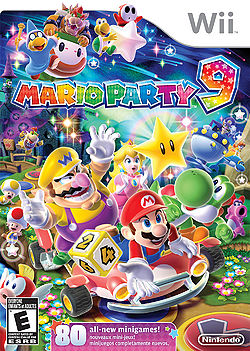 North American box cover For alternate box art, see the game's gallery. | |||||||||||||||||||
| Developer | NDcube CAProduction Nintendo SPD Group No.4 | ||||||||||||||||||
| Publisher | Nintendo | ||||||||||||||||||
| Platform(s) | Wii | ||||||||||||||||||
| Release date | Original release: Nintendo Selects: | ||||||||||||||||||
| Language(s) | English (United Kingdom) English (United States) French (France) French (Canada) German Spanish (Spain) Spanish (Latin America) Italian Japanese Traditional Chinese Korean | ||||||||||||||||||
| Genre | Party | ||||||||||||||||||
| Rating(s) |
| ||||||||||||||||||
| Mode(s) | Single-player, multiplayer | ||||||||||||||||||
| Format | Wii: | ||||||||||||||||||
| Input | Wii:
| ||||||||||||||||||
| Serial code(s) | |||||||||||||||||||
Mario Party 9 is the ninth home console installment of the Mario Party series and the second and final installment for the Wii. The game was the first in the series to be developed by NDcube instead of Hudson Soft, as a result of the latter's acquisition by Konami. It is also the sixteenth in the series overall. The game was released on March 2, 2012 in Europe, in Australia on March 8, 2012, in North America on March 11, 2012, and in Japan on April 26, 2012. The host of the game is a yellow Toad for the boards while a blue Toad is the host for minigames, and a green Toad appears near the end of boards to initiate an event similar to the Last Five Turns Event from past Mario Party games. This is also the twenty-fifth and final installment of the Super Mario franchise overall to be released for the Wii console.
Story[edit]
On a night outside of Peach's Castle, Mario and his friends are gathered to watch the Mini Stars glitter in the sky. As Mario peers though the telescope, he is shocked as he notices that the stars are suddenly being sucked through a vortex. It is then revealed to be Bowser and Bowser Jr. on a spacecraft, who are using a vacuum-like machine to suck the Mini Stars out of the sky and into containers. Witnessing this, the player's character rallies everyone into setting out to defeat Bowser and save the Mini Stars. As they start their journey, Shy Guy and Kamek appear from the woods and infiltrate their group as part of Bowser's plan.
Before each board, there is a cutscene that features Bowser admiring his collection of Mini Stars (or fuming in the last two). Bowser Jr. then runs over to inform his father the progression of the player's group. Bowser is enraged, but confidently summons two of his minions to stop the group before they can take all the Mini Stars. Eventually, however, the group reaches Bowser's space lair, Bowser Station, and face Bowser Jr. before battling his father.
After the final battle with Bowser, the player looks out from the stadium at Bowser's other platform, where the canisters containing all the Mini Stars burst and release them back to where they once were. As this happens, Bowser and Bowser Jr. are flying off. Bowser is mourning over the failure of his plan, which he reveals was to decorate his castle using the Mini Stars. However, upon seeing the released Mini Stars, Bowser is enraged and chases off the ones that fly near him. However, this only results in him falling out of his Koopa Clown Car; Bowser Jr. flies down to save him. Back at Peach's Castle, Mario and friends are once again gathered around the telescope to admire the Mini Stars as they glisten in the night sky.
Gameplay[edit]
In Mario Party 9, a new form of gameplay was introduced in this game, retiring the old format seen in the prior eight titles: players move all at once through the board in a vehicle (a car in Toad Road, a magic carpet in Boo's Horror Castle and a legged machine in Bob-omb Factory, for example), still taking turns rolling, moving from a starting point to an ending point. Instead of rolling a die with a 1-10 on it like in the previous games, players can only roll a dice block with a 1-6 on it; however, there are other dice blocks that can be collected, which includes a dice block that allows a 1-10 roll. Instead of trying to collect coins to buy stars, players receive Mini Stars if they pass by them. While doing so, players must also try to avoid Mini Ztars, which deduct their current amount of Mini Stars. The player who collects the most Mini Stars by the end of the game is declared the winner.
New minigame types are introduced in the Mario Party series, one example being 1 vs. 2 minigames against Bowser Jr. Unlike in previous games, players do not compete in minigames after every player has moved, instead only when a minigame is triggered from the space that is landed upon. Also, when receiving dice blocks, a minigame may pop up afterwards. Unlike previous Mario Party games, where often only the winner(s) of a minigame receives a reward, all minigames are ranked from first to last place and generally all players receive Mini Stars, with players in a higher position earning more Mini Stars.
During a party, there are two board events that are required to occur before advancing: Captain Events and Boss Battles. The former occurs whenever a player arrives on a Captain Event Space. The event differs for each board, but they all allow the players to earn more Mini Stars, though the player that has started the event always has some form of control over the event, putting him or her in an advantage state. As for Boss Battles, there are two Boss Battle Spaces on every board, one near a fortress and one at the end. During the Boss Battle minigames, players must work together to defeat a boss while attempting to increase their own individual scores, as the player with the highest score wins the minigame, which gives more Mini Stars than normal.
Modes[edit]
Party mode[edit]
Once again returning from previous Mario Party games, Party Mode involves the players going around the board like with the previous games, but changed due to the new gameplay mechanics of Mario Party 9. The amount of Party Points that the players earns is determined by how many Mini Stars they have at the end of the game. However, if handicaps are used, the handicap amount does not count towards the Party Point total; for example, if a player has a 50 Mini Star handicap, and finishes with 100 Mini Stars, they only earn 50 Party Points. Notably, should a player end a game with less than 10 Mini Stars, 10 Party Points are added regardless of how low their Mini Star count is. This is independent for each player that ends with under 10 Mini Stars (for example, a 4-player game that ends with Mini Star counts of 105, 67, 60 and 3 without any handicaps gives a total of 242 Party Points although the Mini Star total is only 235).
Solo mode[edit]
The game's story mode, Solo Mode, involves the players traveling across all six boards to defeat Bowser, Bowser Jr., Kamek, and Shy Guy and save the Mini Stars. Completing Solo Mode awards the player 500 Party Points, and the Mini Star grand total is also be added onto the player's Party Point amount; for example, finishing Solo Mode with a grand total of 500 Mini Stars awards the player 1000 Party Points. Shy Guy and Kamek or both appear in all six boards as CPU players competing against the player.
Also, instead of always playing against three other computer players in a four-player match on each board, sometimes, the player plays a three-player match against two computers, or a two-player duel match against one computer (either Kamek or Shy Guy). The minigames for the three-player matches are Free-for-all minigames and 1 vs 2 minigames, and all minigames in two-player matches are Free-for-all minigames, adapted for duels. The award system for minigames in a three-player match is five stars for first place, three stars for second place, and one star for third place, and the award system for minigames in a two-player duel match is five stars for first place and one star for second place. The player often has at least one ally on four boards; if they win instead of the player, then they can still continue to the next board regardless of their final position. If Kamek or Shy Guy wins, then they take all the Mini Stars from the other players and the player must replay the board, similar to a Game Over. If Kamek or Shy Guy ties with the player or an ally, the player still continues to the next stage.
Minigame mode[edit]
In the minigame mode, players can play various different game modes involving minigames. A blue Toad is the host of Minigame Mode. When finished, all game modes award 10 Party Points, except for Free Play, which awards just 1 Party Point per finished minigame.
Free Play[edit]
In the Free Play mode, the players can freely play any minigames they already unlocked in Party Mode.
Step It Up[edit]
- “Be the first player to win a certain number of minigames to become the champion!”
- —In-game description, Mario Party 9
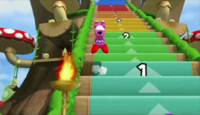
Step It Up is a returning game mode from Mario Party DS. As before, players must climb to the top of a staircase by winning minigames; however, in Mario Party 9, this mode can be played by two or three players, players advance up to four steps when winning a minigame as opposed to one, and the last place player selects a random minigame from a roulette wheel. Some minigames, such as Logger Heads, 10 to Win, Snow Go and Pizza Me, Mario, have unique versions in this mode. In these minigames, once a player completes the goal, the minigame ends; in other modes, other players are still active even after the goal is completed. If everyone wins, everyone gets to climb the stairs. If a minigame ends in a draw, no one climbs up any stairs. Players can select whether they want 3, 5, or 7 minigame wins required for victory. Whoever gets to the top first wins and is greeted by a number of celebrating Whittles if they get first to 3 wins. If the player gets first to 5 wins, a large silver statue of the winning character is seen. If the player gets first to 7 wins, the statue is gold.
The background of Step It Up resembles Tall Trunk Galaxy from Super Mario Galaxy 2, with more Whittles clapping in the background.
- Names in other languages
| Language | Name | Meaning | Notes |
|---|---|---|---|
| Japanese | かちぬきバトル[?] Kachinuki Batoru |
Knockout Battle | |
| Chinese | 爬梯對戰[?] Pátī Duìzhàn |
Ladder Battle | |
| French | Course à l'escalier[?] | Stair Race | |
| German | Kletterkampf[?] | Climbing Fight | |
| Italian | La scalata[?] | The Climb | |
| Korean | 승자진출전[?] Seungja Jinchuljeon |
Winner Advance | |
| Spanish | Escalera hacia el éxito[?] | Stairway to Success |
Garden Battle[edit]
Garden Battle is a mode that can be played by up to four players. The objective in this mode is the players must fill up their garden with groups of colored plant blocks. The plant groups are randomly chosen from a large cart, and the player who places in first in the previous minigame chooses their plant groups first, followed by second place, then third, then last. If everyone is tied for either first or last place, no one puts any plant blocks. A minigame starts when a player chooses one in the minigame wheel. The player who picks the minigame is at first chosen at random, and then the succeeding choices are made by the player who places in last at the preceding minigame.
The plant groups must be able to fit in their garden, or the player does not have a chance to place one in the patch. The game is won when a player completely fills their garden with plants.
The winner has their flowers bloom with the middle one being the biggest. They then do their victory animation and the losers, as well as the yellow and blue Toad, applaud the winner. If the game is played with fewer than four players, the green Toad applauds the winner too.
- Names in other languages
| Language | Name | Meaning | Notes |
|---|---|---|---|
| Japanese | ガーデンバトル[?] Gāden Batoru |
Garden Battle | |
| Chinese | 花園對戰[?] Huāyuán Duìzhàn |
Garden Battle | |
| French (NOA) | Bataille de jardin[?] | Garden Battle | |
| French (NOE) | Bataille de pousses[?] | Sprouts battle, pun on "Bataille de pouces" (thumb war) | |
| German | Gartengerangel[?] | Garden Tussle | |
| Italian | Giardinieri in erba[?] | Budding Gardeners | |
| Korean | 가든 배틀[?] Gadeun Baeteul |
Garden Battle | |
| Spanish | Batalla de jardines[?] | Gardens Battle |
Choice Challenge[edit]
- “Players choose three out of five minigames. Points are awarded based on the results of each minigame. The player with the highest total at the end is the champion!”
- —In-game description, Mario Party 9
Choice Challenge is a game mode that can be played by up to four players. Five free-for-all minigames are randomly chosen, and each player selects three that they would like to play by pressing a corresponding button on the Wii remote. One minigame is announced before the players make their selection as the Chance Minigame; this minigame is worth extra points for the first place player, but normal points for other players.
The players hide in Warp Pipes and emerge only when a minigame they are playing is announced, so it is not clear who is competing in each until then.
The minigames are played in the order of how many players selected it, starting at the least and working up to the most. If only one player selects a minigame, that player is automatically awarded first place points without competing. Sometimes, a character appears out of a pipe when they are not participating in the minigame. If that happens, the blue Toad apologizes for his error and corrects the mistake.
Points are awarded for place in minigames, and standings are announced after each minigame. The players with the most points at the end win. The most points a player can score is 350, while the least is 30. It is possible for all four players to win. The losing players emerge out of their pipes in the order of their point totals (from lowest to highest) and perform their losing animation as their points are displayed. The winning players jump out of the golden pipe and perform their victory animation.
- Names in other languages
| Language | Name | Meaning | Notes |
|---|---|---|---|
| Japanese | えらんでバトル[?] Erande Batoru |
Choose Battle | |
| Chinese | 選擇對戰[?] Xuǎnzé Duìzhàn |
Choose Battle | |
| French | Le bon choix[?] | The right choice | |
| German | Qual der Wahl[?] | Agony of Choice | |
| Italian | Ardua scelta[?] | Hard Choice | |
| Korean | 골라서 배틀[?] Gollaseo Baeteul |
Choose Battle | |
| Spanish | Triple elección[?] | Triple choice |
High Rollers[edit]
- “Play minigames to determine the order in which players roll around the board to pick up points. The first player to reach 500 points is the champion!”
- —In-game description, Mario Party 9
High Rollers is a game mode that can be played with up to four players. In this mode, players compete in a series of minigames to gain up to 500 points by rolling their cube over the panels worth 30, 20 or 10 points. The board is composed of 20 panels and the POW Space in the center. When a player rolls over a number panel, the amount of points it gives a player decreases by 10. When a panel reaches zero, after everyone moves, the blue Toad resets the panel's value to 30.
The number of spaces the player can move depends on what place they get in the previous minigame. First place is allowed to move four spaces, second place moves three, third place moves two, and last place only moves one. The selected player chooses a minigame by stopping the Minigame Wheel. The player who picks first is selected at random, then the succeeding choices are made by the player who finished last place in the last minigame. Any ties are settled by rolls via Dice Blocks. When there are four players, if there are ties for both first place and last place, the first place players roll first and the players in last place roll next. However, if everyone finished first or last in a minigame, no one moves any spaces.
When a player rolls over the POW Space in the center of the board, every panel's point value is decreased by 10. If a block is at zero, then its value resets to 30. The POW Space can only be used by one player per turn, and is first active when everyone has taken their first turn.
Finally, when there is a 100-point gap in between players, the losing players gain a Boost item, which allows them to dash across the board, rolling over number panels and pushing off other players in their way, without using up a space to move. Players who are knocked off the board are unable to take their turn. When they do get a turn again, they land on the POW Space, activating it if it hasn't already been. If a player is blocked by other players and cannot move, they are teleported to the POW Space.
The game ends when one player gets 500 points or more.
The winner gets to go in the hot-air balloon with the blue, yellow, and green Toads while the others hang on to the string underneath the balloon.
- Names in other languages
| Language | Name | Meaning | Notes |
|---|---|---|---|
| Japanese | コロコロバトル[?] Korokoro Batoru |
Rolling Battle | |
| Chinese | 滾滾對戰[?] Gǔngǔn Duìzhàn |
Rolling Battle | |
| French (NOA) | Défi au cubes[?] | Cube Challenge | |
| French (NOE) | Jeu de cubes[?] | Cube game | |
| German | Wolkenwürfel[?] | Cloud Cube | |
| Italian | Il dado è tratto![?] | The Die is Cast | |
| Korean | 데굴데굴 배틀[?] Deguldegul Baeteul |
Rolling Battle | |
| Spanish | Bloques rodantes[?] | Rolling blocks |
Time Attack[edit]
- Main article: Time Attack (Mario Party 9)
Time Attack is a single player mode. The objective of this mode is to beat the ten given minigames in the quickest amount of time, while earning Challenge Bonuses from completing the Bonus Objectives in each minigame. Earning a Challenge Bonus cuts three seconds off the player's completion time for that minigame.
Boss Rush[edit]
- “Compete for Points in a series of six or twelve Boss Battles. The Player with the most points at the end is the champion.”
- —In-game description, Mario Party 9
Boss Rush is a game mode that can be unlocked by purchasing it for 500 Party Points in the museum after the player beats Solo mode, and allows up to four players. In this mode, players compete against each other in six or twelve boss minigames to see who can receive the most points at the end of the game. If the player finishes first in a minigame, they receive five points; finishing second gives them three points; third gives the player two, and fourth gives the player one.
The player has the option to play against either the mid-bosses, the stage bosses, or all bosses. The bosses are fought in the same order as Solo Mode. Diddy's Banana Blast and DK's Banana Bonus are not fought in Boss Rush, due to the fact that despite being categorized as boss minigames, they are just bonus minigames, and Donkey Kong and Diddy Kong are not faced during them. The player with the most points at the end is the winner.
- Names in other languages
| Language | Name | Meaning | Notes |
|---|---|---|---|
| Japanese | ボスゲートバトル[?] Bosu Gēto Batoru |
Boss Gate Battle | |
| Chinese | 首領之門對戰[?] Shǒulǐng Zhī Mén Duìzhàn |
Boss Gate Battle | |
| French | Galerie des boss[?] | Bosses gallery | |
| German | Boss-Marathon[?] | Boss Marathon | |
| Italian | Corsa allo scontro[?] | Race to Clash | |
| Korean | 보스 게이트 배틀[?] Boseu Geiteu Baeteul |
Boss Gate Battle | |
| Spanish | La guarida de los jefes[?] | Bosses hideout |
Museum[edit]
The Museum is where the players can spend Party Points to buy various things such as Mini Star constellations, game sounds, vehicles or extra game modes. They can also watch the credits from here. Once they return a constellation into the sky, the players can go to see it in the sky.
Extras[edit]
In Extras, the player can play through various extra minigames such as Castle Clearout, Shell Soccer or an extended version of Goomba Bowling. There is also a mode called Perspective Mode, in which the player plays through ten minigames that have a modified camera angle, making them harder to win.
Characters[edit]
Playable characters[edit]
There are a total of 12 playable characters in Mario Party 9, consisting of ten default characters and two unlockable characters, Shy Guy and Kamek, who must be unlocked by completing Solo Mode. Koopa is fully playable for the first time in the series, while Kamek also makes his playable Mario Party debut. Due to their roles as opponents in Solo Mode, neither Shy Guy nor Kamek are playable in that mode. Shy Guy, previously playable in Mario Party 4's Beach Volley Folly minigame, is also considered a new playable character.
| *Newcomer Note: Kamek is referred to simply as Magikoopa exclusively in North America. | |||||
Bosses[edit]
| Toad Road | Bob-omb Factory | Boo's Horror Castle | Blooper Beach | Magma Mine | Bowser Station | DK's Jungle Ruins |
|---|---|---|---|---|---|---|
| Mid-bosses | ||||||

|

|

|

|

|

|

|
| Stage bosses | ||||||

|

|

|

|

|

|

|
| Note #1: King Bob-omb is called Big Bob-omb in the British English version. Note #2: In the case of Donkey Kong and Diddy Kong, they are not featured in the Boss Rush because they are not actual bosses, but their respective minigames (DK's Banana Bonus and Diddy's Banana Blast) are considered to be Boss Minigames for the respective board. | ||||||
Other characters[edit]
Boards[edit]
Note: There are three different exclusive vehicles for each board, one available from the start and the other two purchasable from the Museum for 200 Party Points each. They all function identically, but their type depends on the board (for example, cars are used throughout Toad Road). The third vehicle is based off of the stage boss.
| Stage | Description | Captain Event(s) | |||||||||
|---|---|---|---|---|---|---|---|---|---|---|---|
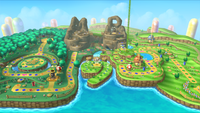
|
Toad Road is the first stage in the game, and thus it is a simple stage with almost no gimmicks. It is designed after World 1 from New Super Mario Bros. Wii, and features lush grassland, flowers and windmills. A broken bridge prevents players from moving forward, and if the players fail to roll a certain total number, they fall to a lower route filled with Mini Ztar Spaces.
|
9 Island | |||||||||
| Toad Road | |||||||||||
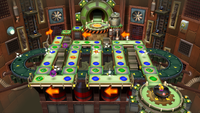
|
Bob-omb Factory is the second stage in Mario Party 9. Players move around a room full of conveyor belts, and if the Captain lands on an Event Space, the conveyor belts move the group of players around, but also the various spaces. Bob-ombs occasionally intrude the players' game. Whenever a Bob-omb explodes, the Captain loses half of their Mini Stars.
|
Side-by-Side Zone | |||||||||
| Bob-omb Factory | |||||||||||
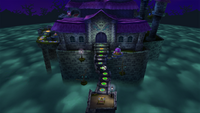
|
Boo's Horror Castle is the third stage in Mario Party 9. Players move throughout a big castle, which is haunted with Boos. After a Captain passes a Boo Portrait, a Boo comes out of it. If a Captain is caught by a Boo, the Boo will steal half of their Mini Stars. Boos follow the players until they leave the current hallway, or enter an alternative room with lights. Before the players can face the boss, the Captain must roll a higher number than the specified numeral on the gate.
|
Scaredy Rat Race | |||||||||
| Boo's Horror Castle | |||||||||||
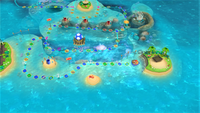
|
Blooper Beach is the fourth stage in Mario Party 9. Players travel along an ocean to reach the end goal. If a Captain passes by a Dolphin, they get five Mini Stars. However, a Sushi takes away half of the Captain's Mini Stars. Huckit Crabs turn all the Mini Stars on the stage into Mini Ztars if a Captain lands on an Event Space, and vice versa if they land on it again.
|
Sunken Treasure | |||||||||
| Blooper Beach | |||||||||||
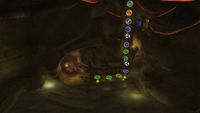
|
Magma Mine is the fifth stage in Mario Party 9. This stage takes place in an active volcano where players mainly travel up and out of the vent. Players must escape rising magma that rises two spaces each turn, and is increased further if a Captain lands on a Magma Space. The Captain must avoid getting hit by magma, or they lose half of their Mini Stars. In Solo Mode, both Kamek and Shy Guy will appear; if they are the only opponents, this ensures the player will have to be the Superstar to move on.
|
Dice Block Chicken | |||||||||
| Magma Mine | |||||||||||
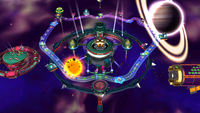
|
Bowser Station is the sixth stage in Mario Party 9. Bowser Jr. and Bowser are the stage's mid-boss and boss, respectively. A Jackpot Machine here increases in Mini Stars if a Captain lands on a Jackpot+ Space. If the Jackpot Machine happens to have 20 or more Mini Stars, a Jackpot Minigame commences, with the total prize being the Mini Stars in the machine. Oddly enough, this stage has no actual hazards. In Solo Mode, both Kamek and Shy Guy appear; if they are the only opponents, this ensures the player will have to be the Superstar to complete the game.
|
Heart Star Colony Bingo Colony Speed Star Colony | |||||||||
| Bowser Station (unlockable) | |||||||||||
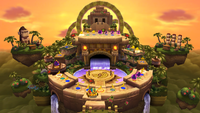
|
DK's Jungle Ruins is the seventh stage in Mario Party 9, which can be purchased from the Museum for 500 Party Points. Instead of collecting Mini Stars, players collect Bananas while trying to avoid Z-Bananas. Players must make two laps around the stage to complete a game. Bananas and Z-Bananas are placed on each space rather than between them. The actual Boss Minigames in this stage are done in form of a bonus minigame to collect Bananas. These games are hosted by Diddy Kong and Donkey Kong respectively.
|
Barrel Choice | |||||||||
| DK's Jungle Ruins (unlockable) | |||||||||||
1 - Pun on "submarine" and "baleen"
2 - Pun on "bone marrow" and "barrow"
3 - Pun on "space shuttle" and "scuttle"
Minigames[edit]
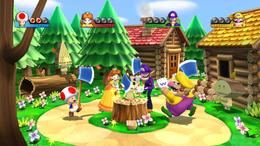
- Main article: List of Mario Party 9 minigames
Mario Party 9 has a total of 78 main minigames, as well as Castle Clearout, Shell Soccer and an extended version of Goomba Bowling playable only in Extra Mode. There are 44 Free-for-all minigames, 10 1-vs-Rivals minigames, 14 Boss Minigames (Including Diddy's Banana Blast and DK's Banana Bonus), and 10 newly-introduced Bowser Jr. minigames, in which two players team up against Bowser Jr. All of the minigames, apart from the extra ones, are playable during various events in the parties, in the various modes of Minigame Mode and a select ten with a single player in the new Perspective Mode, which uses a different camera angle from the one normally seen when playing the minigames.
Items[edit]
Instead of more traditional items, Mario Party 9's items consist entirely of Dice Blocks, allowing the user to roll a specific number more easily from a specific range of values. These can be obtained by landing on a Dice Block Space.
| Item | Image | Description |
|---|---|---|
| Dice Block | 
|
Dice Block numbered 1 to 6. The dice rolled if no items are used. (1, 2, 3, 4, 5, 6) |
| Slow Dice Block | 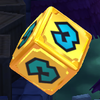
|
Dice Block numbered 1 to 6 that rolls slowly to allow for ease of rolling a specific number. (1, 2, 3, 4, 5, 6) |
| 0-1 Dice Block | 
|
Dice Block numbered 0 to 1. (0, 0, 0, 1, 1, 1) |
| 1-2-3 Dice Block | 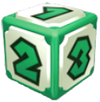
|
Dice Block numbered 1 to 3. (1, 1, 2, 2, 3, 3) |
| 4-5-6 Dice Block | 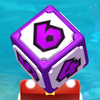
|
Dice Block numbered 4 to 6. (4, 4, 5, 5, 6, 6) |
| 1-10 Dice Block | 
|
Dice Block numbered 1 to 10. (1, 2, 3, 4, 5, 6, 7, 8, 9, 10) |
Spaces[edit]
When a player lands on a space, something is going to happen. Each space has its own effect, but like in previous Mario Party games, every space is color-coded. The color of the space tells what kind of event is going to happen.
- Normal Spaces
- Blue Spaces - Triggers good events and helps the player who landed on it.
- Red Spaces - Trigger bad events and hinders the player who landed on it.
- Green Spaces - Neutral spaces that often lets one or all players attend an event that can either help or hinder the player.
- Yellow Spaces - Trigger minigames when landed on.
- White Spaces - Adds Mini Stars to the Jackpot on the Bowser Station board.
- Star Spaces
- Mini Star Spaces - Gives Mini Stars to the player who landed on it.
- Mini Ztar Spaces - Takes Mini Stars from the player who landed on it.
If the player moves over a space with a prohibitory sign on it, they automatically stops at that space and an event starts. The only two spaces of this kind are the Boss Space and the Captain Event Space.
Because of the new rules in Mario Party 9, there are many new spaces introduced. Some old spaces returned as well, but some have a different effect (for example the Blue Space). With a total of 21 different kind of spaces, Mario Party 9 has the most spaces of the series. Also for the first time in the Mario Party series, some spaces are unique for a specific board. Here is a list of all the spaces in the game, with what kind of effect they have.
| Space | Effect | Rarity | |
|---|---|---|---|
| Appears on all boards | |||
| Green Space | Nothing happens when the player lands here. | Common | |
| Dice Block Space | The player landing here receives a special Dice Block. | Common | |
| Lucky Space | Something good happens to the player landing here. | Semi-Common | |
| Unlucky Space | Something bad happens if the player lands here. | Rare | |
| Event Space | As the player lands here, a special event occurs. | Uncommon | |
| Shuffle Space | The players' order to become Captain changes. | Semi-Common (None when playing with 2 players) | |
| Dash Space | The player landing here can move again by hitting another Dice Block. | Uncommon | |
| Back Space | The player landing here has to move backwards by hitting a Dice Block again. | Uncommon | |
| Spin Space | Something special happens to the player landing here, helping them. | Uncommon | |
| Bowser Space | If the player lands here, they summon Bowser to hinder them. | Uncommon (Common near the end of stages) | |
| Mini Star Space | The player landing here receives the number of Mini Stars over the space. | Rare | |
| If the player lands here, they get 2 Mini Stars. | |||
| If the player lands here, they get 3 Mini Stars. | |||
| If the player lands here, they get 5 Mini Stars. | |||
| Mini Ztar Space | If the player lands here, they lose Mini Stars. | Rare | |
| If the player lands here, they lose 2 Mini Stars. | |||
| If the player lands here, they lose 3 Mini Stars. | |||
| If the player lands here, they lose 5 Mini Stars. | |||
| Captain Event Space | Arriving at or landing on this space triggers a Captain Event and will automatically end the Captain's turn on this space. | 1 on each stage except for Blooper Beach and Magma Mine, which have 2, and Bowser Station, which has 3. | |
| Boss Battle Space | Arriving at or landing on this space triggers a Boss Battle and will automatically end the Captain's turn on this space. | 2 on each stage | |
| Free-for-All Space | If the player lands here, everyone competes in a minigame. | Semi-Common | |
| 1-vs-Rival Space | If the player lands here, they trigger a 1-vs-Rival minigame with them being the solo player. | Uncommon (None when playing with 2 players) | |
| Bowser Jr. Space | If the player lands here, they and another randomly-chosen player take part in a Bowser Jr. minigame. | Uncommon (None when playing with 2 players) | |
| Battle Space | A minigame commences in which all players must participate. Mini Stars are distributed differently from regular minigames. | Semi-Common (None when playing with 2 players) | |
| Board-specific Spaces | |||
| Magma Space | Raises the lava level by 2 on the Magma Mine board. | Common | |
| Raises the lava level by 3 on the Magma Mine board. | Semi-Common | ||
| Raises the lava level by 4 on the Magma Mine board. | Uncommon | ||
| Jackpot+ Space | Adds 5 Mini Stars to the Jackpot Machine on Bowser Station. | Common | |
| Adds 8 Mini Stars to the Jackpot Machine on Bowser Station. | |||
| DK Space | If the player lands here, DK starts an activity where they try to collect the most Bananas spinning in a circle around the board. | Common | |
| Jackpot Space | Gives the Captain all the Mini Stars stored on the Jackpot Machine. | Rare | |
Differences from previous Mario Party games[edit]
This is the first Mario Party in the series:
- to not be developed by Hudson Soft.
- to have Mini Stars instead of coins and Power Stars.
- to change the core board gameplay by having all the players together in one vehicle.
- to not have Red Spaces, replacing them with Mini Ztar Spaces.
- to not include Advice or Hints in the Minigame Rules Screen.
- to not include a category of 2-vs-2-Minigames, and the first since Mario Party 2 to not include a category of Duel Minigames (if the 1-vs.-1 Story Minigames and/or the etc. Minigames from Mario Party 4 are counted as Duel Minigames). Additionally, it does not have the team battle mode first introduced in Mario Party 4.
- since Mario Party 2 to have only one save file instead of three.
- since Mario Party 6 to not feature Toadette in any capacity.
- to not use the usual Mario Party font for the in-game text in any way.
- to use the modern font for the in-game text, first used in Super Mario 3D Land.
- to not save game progress after every turn, instead saving after the game is over.
- to not start out with a 1-10 Dice Block.
- to have fewer playable characters than its numbered predecessor.
- since Mario Party 3 to have a unique Superstar animation.
- to allow the player to progress in the Solo Mode without winning on a board (as the player can still progress when achieving a tie or when an ally wins on a board).
- to have a separate win screen after a minigame ends, instead of the traditional minigame endings.
Reception[edit]
Reviews for Mario Party 9 have been generally mixed to positive. It has received a 73 from Metacritic based on 45 reviews.[8] and a 75.05% from GameRankings based on 30 reviews.[9] IGN gave it a 7/10 explaining that the graphics are good but the music is repetitive and the luck plays a big role in determining a player's fate in the game. GameSpot gave it a 6.0 explaining that it is too familiar and that Solo mode is tedious and required for unlocks. Game Informer gave the game a 5.75/10, explaining that the game relies far too heavily on luck and can make for a "disheartening experience."[10] Destructoid gave the game a 7.5/10, praising the reduction of motion-control minigames, and saying that many of the minigames feel like true Super Mario experiences and not Super Mario versions of party games, and that the influence of New Super Mario Bros. Wii and Super Mario Galaxy, and to a lesser extent, Super Mario Sunshine, is "pretty much the game's central theme," and that it feels more like an "honest-to-god" Super Mario game than the other entries, but complained that the game is still determined a lot by chance.[11]
| Reviews | |||
|---|---|---|---|
| Release | Reviewer, Publication | Score | Comment |
| Wii | Samuel Claiborn, IGN | 7.0/10 | "The Mario Party games are meant to be played with a room of friends (and the total lack of online play reflects this). But every party will always be subverted by this entry's reliance on randomness to "shake things up," as Bowser puts it when he is about to do something awful to you. This is especially irksome for me because I can envision what Mario Party 9 could be -- a clever, strategic board game with mini-games interspersed would be truly awesome." |
| Wii | Ashton Raze, GameSpot | 6/10 | "Overall, Mario Party 9 is a decent package with a lot of content, even if the Story mode is something you'll wish you could avoid. It's colorful, good looking, and fun with others, but after so many games, the appeal just isn't going to last for many people. There's no denying that what Mario Party 9 does, it largely does well; it's just that it's largely been doing it well for nine console games and two handheld games. Once you've spent a few hours with mates, seen all the different boards, and played all the minigames, there's very little incentive to return. Much like that high school reunion, it is fun for a night, but you won't have any hesitation about moving on." |
| Wii | Jonathan Holmes, Destructoid | 7.5/10 | "Solid and definitely has an audience. There could be some hard-to-ignore faults, but the experience is fun." |
| Wii | Kyle Hilliard, Game Informer | 5.75/10 | "There are things about Mario Party 9 that make it a better experience than previous entries, but overall it's still a disheartening experience. The best times I experienced with the game were the times when co-workers and I were laughing at each other’s stupid mistakes while playing, but you really don't need a video game to fuel stupid mistakes worth laughing at." |
| Wii | Tom Orry, VideoGamer.com | 7/10 | "The Wii has always been about bringing people together to play, and Mario Party 9 does that considerably better than I thought it would." |
| Aggregators | |||
| Compiler | Platform / Score | ||
| Metacritic | 73 | ||
| GameRankings | 75.05% | ||
Sales[edit]
Mario Party 9 is the 26th best-selling game for the Wii, having sold 2.24 million copies worldwide, as of September 2012.[12]
Promotion[edit]
Mario Party 9 Party Crashers Contest[edit]
The Mario Party 9 Party Crashers Contest was a contest sponsored by Nintendo of America from March 1, 2012 at 10:00 EST until March 7, 2012 at 23:59 EST. Participants were required to organize a party of 25 confirmed guests at a location of their choosing within the United States (excluding Hawaii), follow Nintendo of America on Twitter, and, using the hashtag "#1UPMyParty", tweet in 140 characters or less why they would want to have their party crashed. The company then judged the tweets based on "how uniquely, creatively and enthusiastically [they show] love for Mario Party 9" and selected six winning entries, the authors of which would receive a Wii, a copy of Mario Party 9, and a 30-minute visit from Mario and Luigi at the author's party.[13]
Pre-release and unused content[edit]
- Main article: List of Mario Party 9 pre-release and unused content
The design of the Toad Road board for the build presented during the E3 trailer had a somewhat simpler design. While an early version features the same layout and many of the same features, the "9 Island" seen in the final game is not present, featuring a circular island in its place. The circle island on the final board also replaces a mountain with a waterfall in an early version. The in-game font for the E3 build was based off the Mario Kart: Double Dash!! in-game font, but was changed to the font used in the newer games on the final version.
Gallery[edit]
- For this subject's image gallery, see Gallery:Mario Party 9.
Mario, Princess Peach, Yoshi, and Wario
Staff[edit]
- Main article: List of Mario Party 9 staff
Mario Party 9 is developed by NDcube, the same company that has developed Wii Party. NDcube consists of former employees of Hudson, a company involved in the previous Mario Party titles. Shuichiro Nishiya and Tatsumitsu Watanabe are the main directors of this game. The programming director is Shinji Shibasaki. The sound director is Hiroyuki Tsuboguchi while the music director is Chamy. Ishi. Meanwhile, NOA Product Testing has been involved in debugging the game.
Media[edit]
- For a complete list of media for this subject, see List of Mario Party 9 media. For this subject's sound test, see Mario Party 9 sound test.
| File info 1:21 |
| File info 0:30 |
| File info 0:30 |
| File info 0:30 |
| File info 0:30 |
| File info 0:30 |
References to other games[edit]
- Super Mario Bros.: An extract of the Ground Theme is incorporated into the song "Freshen Up!" (played in the minigame Speeding Bullets), while the song "Super-Duper Mario Bros." features the complete theme (played in Castle Clearout and Shell Soccer). Another arrangement of the Ground Theme plays in the Museum. The title theme features the Ground Theme's first six notes halfway through. The music in the minigame mode Choice Challenge is an arrangement of the Underground Theme. The bridge tiles during Goomba Bowling are very similar to the stones in the overworld levels, and a portrait in Boo's Horror Castle features Mario from this game jumping out of a warp pipe.
- Super Mario World: An extract from the music of the Results screen of the boards is an arrangement of the Ground Theme. Also, Bowser appears with his Koopa Clown Car. Fortresses self-destruct once the mid-boss is defeated.
- Mario Kart series: Lightning appears in King Boo's Puzzle Attack
- Super Mario 64: The music when Bowser appears to initiate a Boss Battle is the beginning of the Koopa's Road theme. The constellation for the Bob-omb references Bob-omb Buddies. The concept of underwater shell riding (used in the Cheep Cheep Boss Battle) is taken from this game.
- Luigi's Mansion: King Boo is a boss. Also, Boo's Horror Castle resembles the mansion.
- Super Mario Sunshine: A Pianta appears in the minigame Pianta Pool.
- Mario Party 4 / Mario Party 5: Some voice clips are reused.
- Mario Kart: Double Dash!!: The Barrel Roller from DK's Jungle Ruins resembles the DK Jumbo. Also, some voice clips are recycled.
- Mario Party 6 / Mario Party 7: Some voice clips are reused.
- Mario Party Advance: The game uses a vehicle to move on the board. Also, Toad Mobile, the default vehicle from Toad Road resembles the car from this game.
- Mario Party 8: Some voice clips are reused.
- Super Mario Galaxy: The ground-pound switch icon appears on Wiggler's body segments and on Whomp's back. Also, the music of some Bowser Jr. Minigames is an arrangement of Bowser Jr.'s theme of the game. Voice clips reused from this game include Boo's.
- Mario Party DS: The Step It Up minigame mode and boss minigames return, the latter of which would become a series staple and reappear in future installments of the series. Some voice clips from the game are reused in this game.
- Mario Kart Wii: Some voice clips are recycled.
- New Super Mario Bros. Wii: Many of the environments and minigames in the game are based on the worlds of this game, including the background of the minigame Upward Mobility. The design of the Ice Flower of this game appears in King Boo's Puzzle Attack. Bowser Jr. appears in his Junior Clown Car. Also, some of the Bowser Jr. Minigame music is an arrangement of Bowser Jr.'s battle music in this game. Toad Houses also appear, in the same style as those in this game. The character stances are also from this game. Also, the jumping noise is the same from this game.
- Super Mario Galaxy 2: In the minigame Logger Heads, a group of Whittles appear. They also appear in the Step It Up minigame mode in the background of the tree, and they congratulate the winner when they reach the top of the tree. The setting of the boss minigame Bowser's Block Battle is similar to the areas where Mario would meet Bowser in the game. The hammers Bowser Jr. uses in Bowser Jr. Breakdown are similar to the ones used by Megahammer.
- Wii Party: Many minigames in Mario Party 9 have similar gameplay to those of this game, which was also developed by NDcube. The rules and control screens of Mario Party 9 resemble those of this game. The 1st-4th place formula of this game is also reused.
- Super Mario 3D Land: In the minigame Goomba Spotting, the Goomba Tower enemy returns and the binoculars interface resembles the one used when Mario or Luigi looks through the binoculars. Graphics and a few elements, as well as the font used in this game are borrowed as well.
References in later games[edit]
- Mario Party: Island Tour: All playable character's voice clips are reused, as well as the announcer. Bowser Jr.'s voice clips are recycled.
- Mario Party 10: The vehicle gameplay mechanic returns. A rearranged version of Mario Party 9's minigame victory music is used.
- Mario Party: The Top 100: Ten minigames and rearrangements of their respective music return.
- Mario Party Superstars: Four minigames and rearrangements of their respective music return. Birdo's 2nd and 4th place animations are reused as her "neutral" and losing animations respectively, and her artwork is reused from this game. Bowser and the Koopa Clown Car's artwork is an updated version of their artwork from the game's boxart.
- Super Mario Bros. Wonder: Yoshi's artwork is reused in this game's boxart, except recolored for Yellow Yoshi.
- Super Mario Party Jamboree: The theme after completing a minigame in Free Play is an arrangement of "Good Job!"
- Later Mario Party games: The 1st-4th place formula (originally from Wii Party) is reused in later games up to The Top 100. The playable characters' Blue Space and Red Space animations are also reused in later games.
Names in other languages[edit]
| Language | Name | Meaning | Notes |
|---|---|---|---|
| Japanese | マリオパーティ9[?] Mario Pāti 9 |
Mario Party 9 | |
| Chinese | 瑪利歐派對9[?] Mǎlìōu Pàiduì Jiǔ |
Mario Party 9 | |
| Korean | 마리오 파티 9[?] Mario Pati 9 |
Mario Party 9 |
Trivia[edit]
- This is the only Super Mario game on the Wii to use the modern Super Mario font for the in-game text, including Mini Star counts.
- This is the only Traditional Chinese Wii game that does not mention iQue in its credits. All Chinese localization was done by Nintendo Hong Kong and Taiwan personnel.
- When playing Party Mode or Solo Mode, when Toad or Shy Guy are the captain, they stand on a circle stand due to their height.
- If the player shakes the Wii Remote on the title screen, the stars with the characters on them move faster and their voice clips play.
- This is the last Super Mario game to support the Dolby Pro Logic II standard, which allows home console video games to output 5.1 surround sound when fed through an appropriate decoder. Nintendo had included Pro Logic II encoding in numerous Mario titles since Super Mario Sunshine in 2002.
References[edit]
- ^ https://www.nintendo.com/en-za/Games/Wii/Mario-Party-9-281870.html
- ^ Mario Party 9 para Wii. LevelUp.
- ^ [1]
- ^ [2]
- ^ [3]
- ^ http://mariopartylegacy.com/2013/03/south-korea-gets-release-dates-for-mario-party-9-and-mario-tennis-open/
- ^ http://www.nintendo.co.kr/Wii/software/marioparty9/index.html/
- ^ Metacritic score for Mario Party 9. Metacritic. Retrieved June 10, 2017.
- ^ GameRankings score for Mario Party 9. GameRankings. Retrieved June 10, 2017.
- ^ Game Informer Score for Mario Party 9. Game Informer. Retrieved June 29, 2017.
- ^ Destructiod score for Mario Party 9. Destructoid. Retrieved June 29, 2017.
- ^ Financial Results Briefing for the Six Month Period Ended September 2012 (Briefing Date: 2012/10/25). Nintendo.co.jp. Retrieved June 28, 2022.
- ^ Official Rules for Mario Party 9 Party Crashers Contest. marioparty9.nintendo.com. Archived February 26, 2015, 23:34:41 UTC from the original via Wayback Machine. Retrieved August 9, 2024.
External links[edit]
- Official American website
- Official Mexican website
- Official European website
- Official Oceanian website
- Official Japanese website
- Official Korean website
- Official Hong Kong website
- Official Taiwan website
